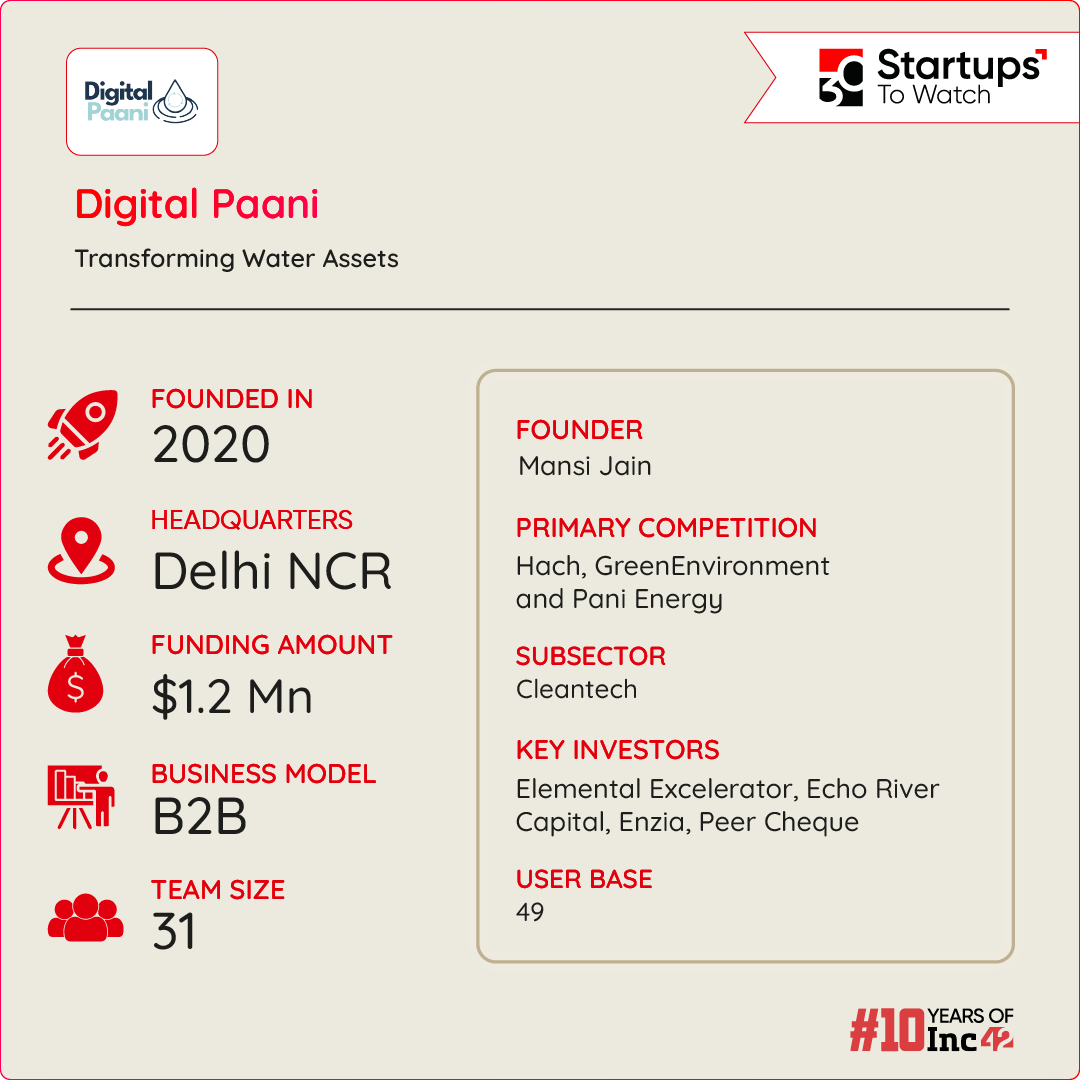Startup Stories
Startups That Caught Our Eyes In January

The year 2023 was one of the most important crucible moments for the Indian startup ecosystem in recent memory, filled with regulatory challenges, record-low funding influx and many, many more problems.
For some context, Indian startups had only managed to secure around $10 Bn in funding until December 25, 2023, according to Inc42’s ‘Indian Tech Startup Funding Report 2023’, as wary investors refrained from fuelling break-neck growth. The scarcity of funding was such that Indian startups had raised $12 Bn in 2018 – three years before the paradigm-shattering year of 2021.
As Indian startups adapted to the ‘new normal’ of massive funding shortfalls fueled by prolonged negative investor sentiment, there were questions about whether the up-and-coming startups in India would survive in an ecosystem more and more driven by a Darwinian environment, in which only the leanest and fittest companies would survive.
Even so, we were able to identify and celebrate 210 early stage startups during the year, which we covered across seven editions of 30 Startups To Watch. As we usher in 2024 with our 43rd edition of 30 Startups To Watch, we remain committed to the cause of discovering more Indian startups that we believe have the potential to take up the mantle of the next big thing.
In this edition, we have selected startups from a broad array of sectors, going from the ‘traditional’ startup segments of fintech, ecommerce and enterprise tech to new disruptors such as GenAI, electric vehicles and cleantech. What sets this cohort apart is that more than 70% of the featured startups have secured funding below $2 Mn.
Further, keeping in line with the trend we observed towards the end of last year, a significant portion of the 43rd cohort of 30 Startups To Watch is bootstrapped, signalling in no uncertain words that raising funding is secondary to driving innovation for a startup.
Continuing our tradition of identifying some of the most pathbreaking startups every month, we bring you 30 startups that caught our attention this January.
Editor’s Note: The list below is not a ranking of any kind. We have listed the startups alphabetically.
Aarogya Tech
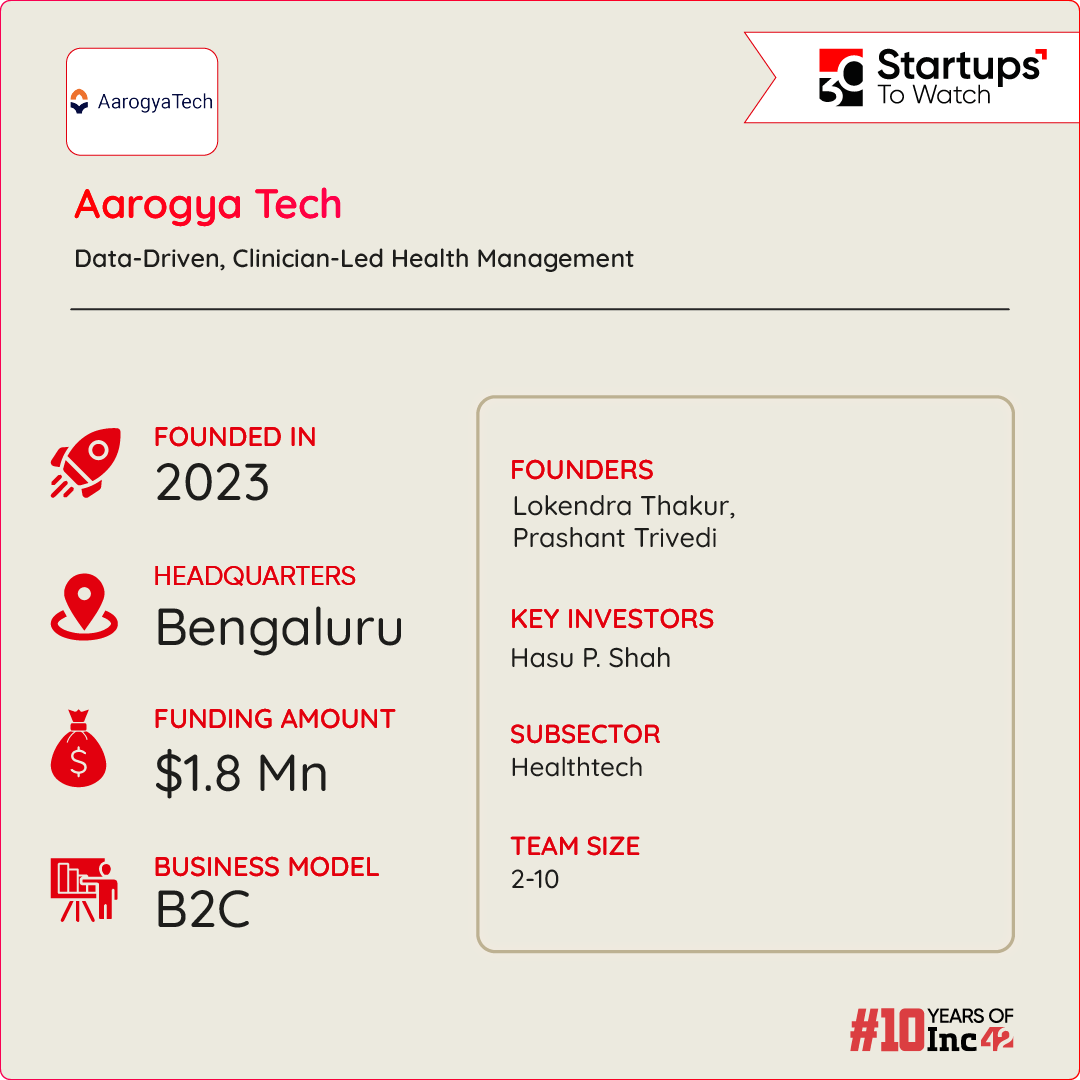
Data-Driven, Clinician-Led Healthcare
Founded by IIT Kanpur and ISB alumnus Prashant Trivedi and Mayo Clinic-trained Critical Care Physician Dr. Lokendra Thakur in early 2023, Aarogya Tech offers clinician-led, data-based personalised health management solutions tailored for home and community settings.
The startup’s primary goal is to enhance population health, improve quality of life, and extend longevity by focussing on disease prevention and early diagnosis. Aarogya Tech’s vision revolves around democratising healthcare by providing accessible, intelligent health companionship.
Its approach emphasises affordability, data-driven insights, and the expertise of clinicians, thereby shifting the focus of healthcare from traditional hospital settings to the comfort of individuals’ homes and communities.
In just a year of operation, Aarogya Tech has achieved significant milestones. It has developed a disease-specific patient monitoring system aimed at reducing chronic heart failure readmission rates to combat prevalent health challenges. Additionally, the Bengaluru-based startup launched DocSeva.com, a personalised health management platform catering to over 10 businesses in Bengaluru.
Alt Carbon

Locking Carbon For Sustainable Farming
The voluntary carbon offset market is predicted to become a $250 Bn market opportunity by 2050. Founded by Shrey Agarwal in 2023, Alt Carbon aims to meet this demand by focussing on permanent sequestration.
Founded with a personal connection to the challenges faced by Darjeeling’s tea industry due to climate change, ALT Carbon is on a mission to make a significant impact on global carbon removal goals. Using accelerated silicate weathering with Basalt dust, their innovative product aims to contribute up to one-third of humanity’s gigaton carbon removal targets.
ALT Carbon’s process replaces traditional agricultural lime, not only balancing soil pH but also efficiently removing carbon dioxide. The company adopts a comprehensive approach, incorporating a robust measurement methodology, collaboration with agricultural partners, and an advanced soil nutrient management system.
In the short term, ALT Carbon aims to permanently remove 1,000 tonnes of carbon in 2024, while assembling a team of top-tier geologists and geochemists. Looking ahead to 2026, its goal is to achieve the permanent removal of more than 1 Mn tonnes of carbon.
Ambitio

Studying Abroad Made Easy
While an increasing number of Indian students aspire to go abroad for higher education, the overall process concerning this could be inconvenient and complex.
Founded by Vikrant Shivalik, Dirghayu Kaushik and Vaibhav Tyagi in 2022, Ambitio specialises in the global education admissions process through its AI platform, which serves as a copilot for higher education abroad.
Recognising the complexities and challenges faced by students aspiring for global education, the platform leverages decentralised information and advanced language models to provide personalised admission advice.
The platform’s unique selling points lie in its ability to offer tailored guidance, enhancing user engagement and stickiness. Ambitio operates on a subscription-based revenue model, charging students INR 1,500 for six months. It also has an Elite subscription plan for a higher fee, which provides additional expert support.
Since its beta launch in July last year, the platform has onboarded 10,000 active users. It has 150 paid customers and generates 60 Lakh in revenue.
Ambitio’s short-term plans for 2024 include assisting over 1K students in their college applications, while long-term ambitions include assisting more than 50,000 students by 2026. With a focus on providing comprehensive support and leveraging advanced AI, Ambitio seeks to establish itself as a leading digital advisor in the global education admissions space.
BatX Energies
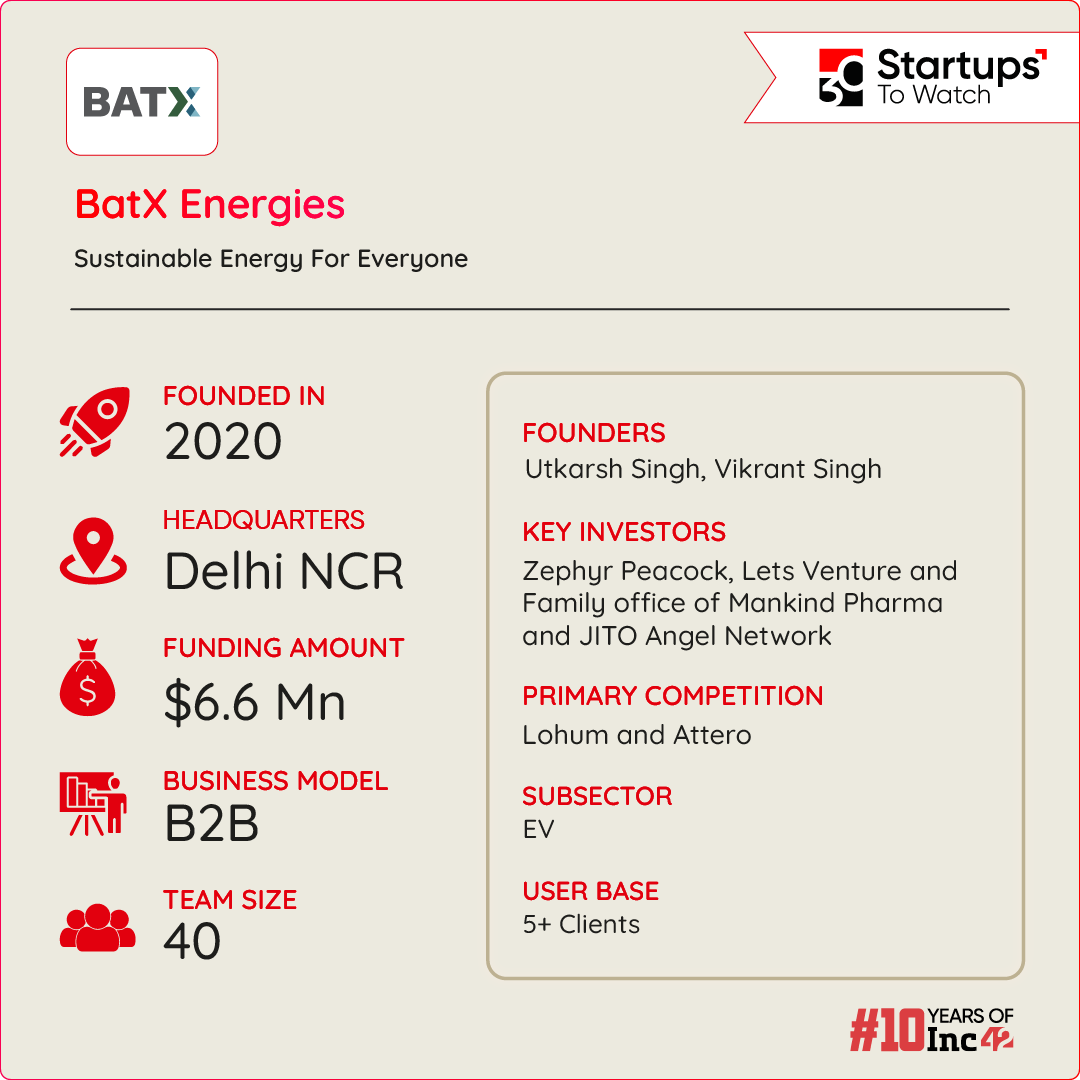
Sustainable Energy For Everyone
The growing demand for electric vehicles in India has not only brought forth the need for lithium-ion batteries but also the way they are being recycled.
Founded in 2020 by Utkarsh Singh and Vikrant Singh, BatX Energies specialises in the recycling of lithium-ion batteries.
With a focus on a circular economy, BatX works on extracting crucial metals – Lithium, Nickel, and Cobalt – from used batteries. These recovered metals serve as vital components for battery cell manufacturing.
With a 20-year patent from the Government of India, BatX employs its “Zero Waste-Zero Emission Scrap Lithium Battery Recycling Technology”. The company’s operational footprint spans across India, with facilities in Bulandshahr, Uttar Pradesh and a corporate office in Gurugram. Boasting an extensive reverse logistics system, BatX efficiently collects and optimises waste on a pan-India scale.
BatX has plans to establish operations in Hosur, Kolkata, and Surat, while simultaneously venturing into Malaysia and the US.
The company is planning to get listed by 2027. It has set its eyes on generating INR 600 Cr in revenues and becoming 10% EBITDA profitable by 2026. Meanwhile, BatX aims to establish a cathode powder production facility utilising recycled materials within two years.
Beatoven.ai

Leverage AI To Create Royalty-Free Music
Besides core technology, AI is being used in the creative industry as well, empowering content creators. For example, several AI tools are helping creators to automatically generate unique soundtracks in response to user inputs.
Beatoven.ai was founded by Mansoor Rahimat Khan and Siddharth in 2021. With 18 years of experience in sitar playing and a family legacy in music spanning seven generations, Khan teamed up with Siddharth, a music technologist with IT and sound computing expertise, to create a groundbreaking solution.
The product empowers content creators to compose original soundtracks effortlessly. By providing text or genre prompts, users can harness the AI’s ability to understand intent, resulting in diverse and authentic soundtracks spanning multiple genres, including unique offerings like Indian classical and world music.
Beatoven.ai operates on a subscription and pay-per-track revenue model. It has a stronghold in key markets such as the US, Europe, and South Korea. The product is patent-pending in India and the US.
Recent milestones include the starting of monetisation in October and achieving impressive organic growth with 8 Lakh registered users within a year.
The startup’s short-term plans for 2024 involve significant investment in music composition research, leveraging the expertise of Europe-based PhDs to enhance music quality. The long-term vision by 2026 is to establish Beatoven.ai as the go-to solution for music and sound effects generation, targeting a $10 Mn annual recurring revenue.
Bharatsure
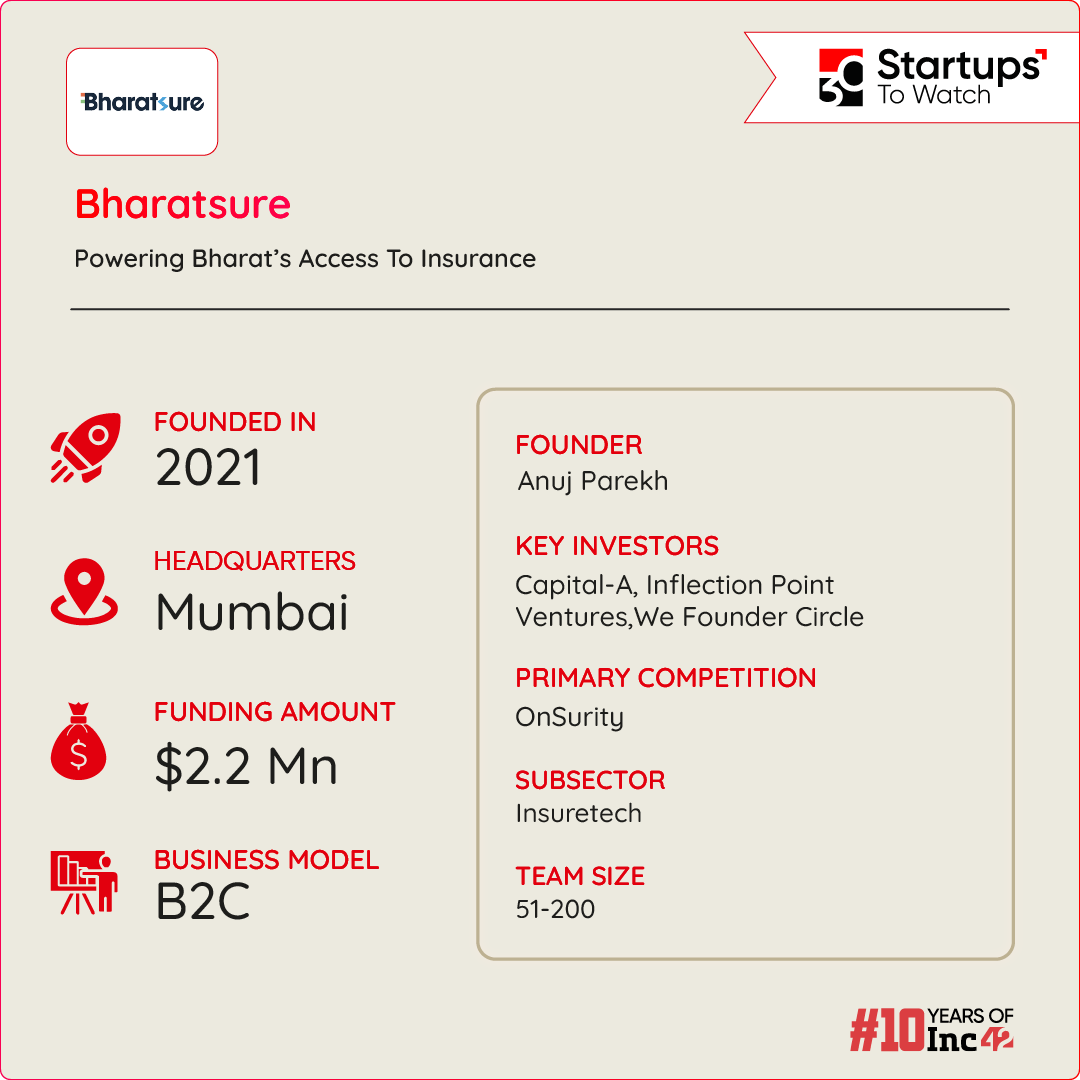
Powering Bharat’s Access To Insurance
Traditional distributors have long dominated the Indian insurance space. However, insurtech startups are now trying to capture this realm with the help of technologies such as AI, ML and Big Data and by enhancing the efficiency of insurance processes.
Bharatsure, founded by Anuj Parekh in 2021, is a provider of Infrastructure-as-a-Service (IaaS) solutions tailored for insurance distributors. Catering to licenced brokers, agents, banks, and institutions, Bharatsure enables them with seamless distribution of group insurance and healthcare products.
Its infrastructure solution not only supports insurance distributors but also enables them to offer embedded insurance and healthcare options to end customers. The solution focuses especially on group health insurance, making it easier for distributors to provide these services seamlessly.
By offering a full-stack technology solution encompassing servicing and product infrastructure, Bharatsure allows distributors to focus entirely on their core competency of selling insurance. The company strategically partners with brokers, agents and B2B institutions to enhance its technological capabilities, servicing, product offerings and assisted sales processes.
With Bharatsure’s plug-and-play API suite, embedded insurance and healthcare solutions become easily accessible for customers across various third-party platforms. Bharatsure collaborates with leading insurers and TPAs through API integrations and its partners include ICICI Lombard, Digit, and Medi Assist.
ControlZ
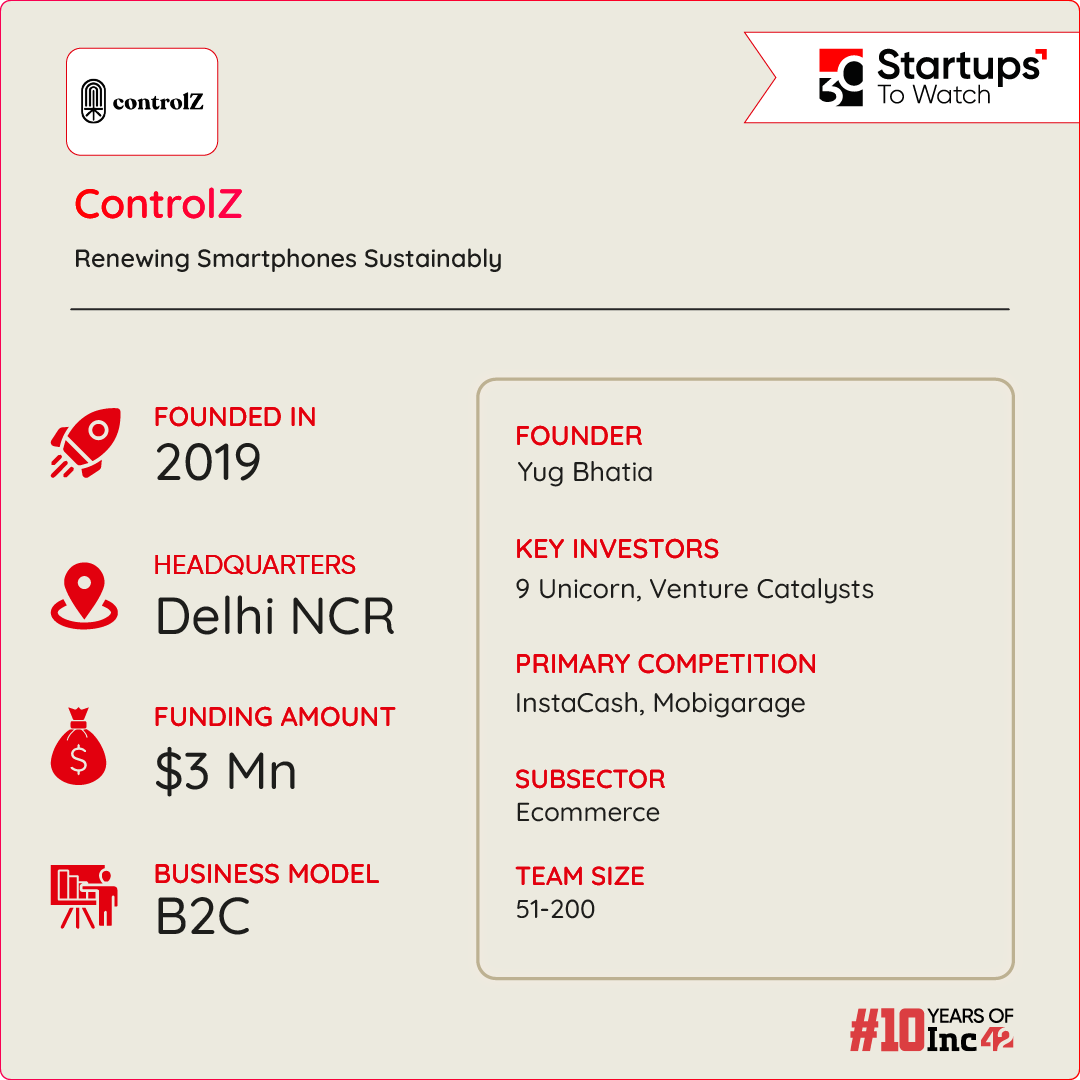
Renewing Smartphones Sustainably
With the rise in online sales of new smartphones, there’s a growing trend among consumers to trade in their devices, thereby bolstering the supply in secondary markets. As such, despite its unorganised nature, India’s refurbished phone market commands an estimated worth of nearly $4 Bn.
Founded by Yug Bhatia, ControlZ specialises in the component-level renewal of pre-owned devices. Unlike other refurbished devices, ControlZ focuses on renewing both cosmetically and functionally, increasing its life cycle and ultimately reducing the carbon footprint of smartphone manufacturing, which is believed to be over 85-95% of a device’s annual carbon footprint.
With a commitment to sustainability, ControlZ promotes conscious consumption by making old devices like new ones and reducing the demand for new smartphones. Through its efforts, ControlZ aims to establish new benchmarks in sustainability and change how the world thinks about smartphone consumption.
DashLoc
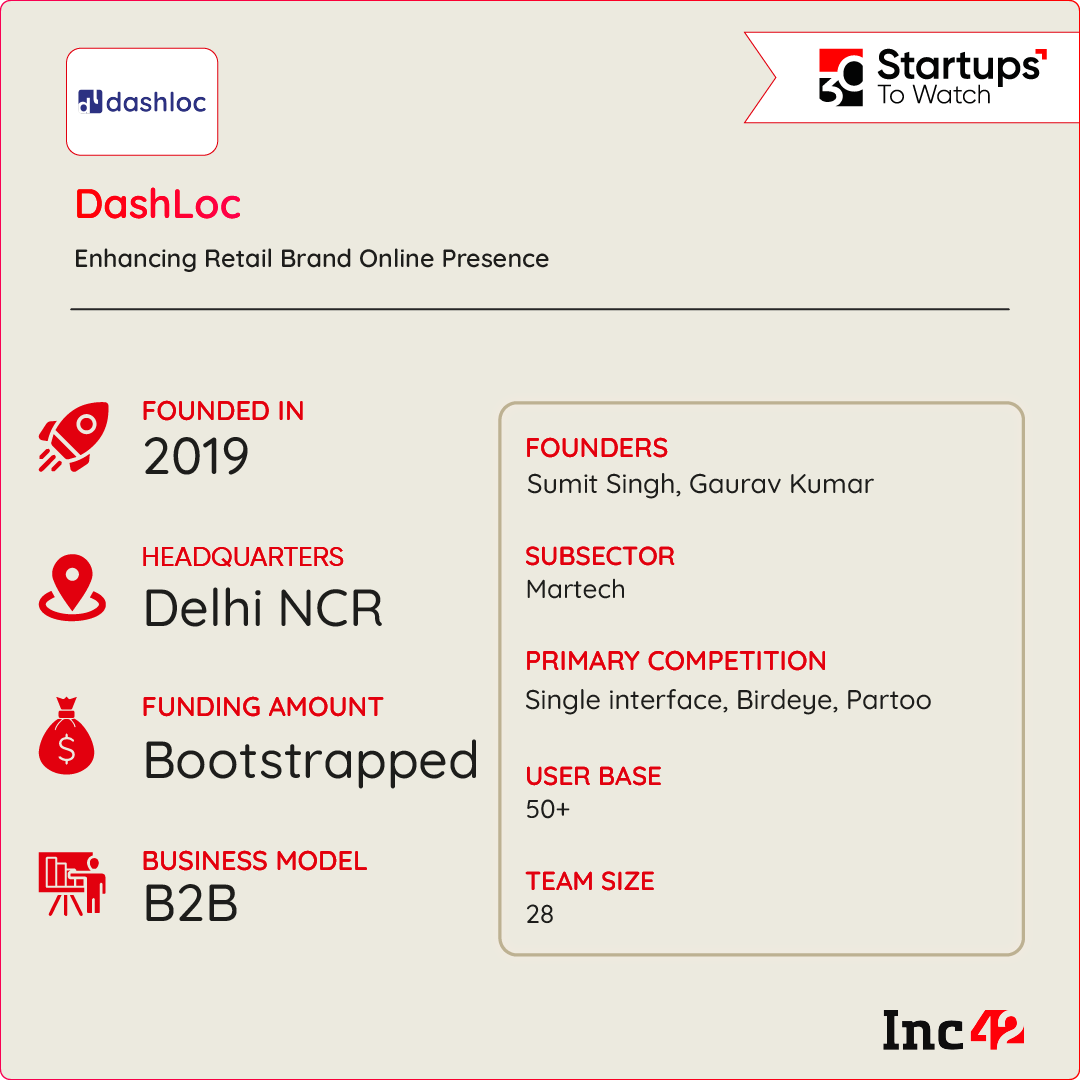
Stimulating Hyperlocal Growth For Retail Outlets
Founded in 2019, DashLoc is working on offering a comprehensive solution to businesses so that they can manage their online presence efficiently. DashLoc provides monitoring, review management, and local SEO services, along with detailed reporting and analytics. Through integration with various platforms, it ensures accurate and visible business listings.
Key solutions offered by the startup include a comprehensive platform that helps businesses manage their online presence, engage customers and reputation, and generate leads.
DashLoc’s revenue model depends on the number of physical outlets, offering three plans. In Plan A, enterprises receive listing management services only. Plan B includes optimisation, listing management, and the creation of microsites for individual stores. Plan C includes all features, including call tracking, multilingual support, and an AI-based chatbot for review management.
The startup’s long-term vision involves turning into a globally recognised brand while also extending its services to individual store consumers, thereby expanding the market presence.
DevDham
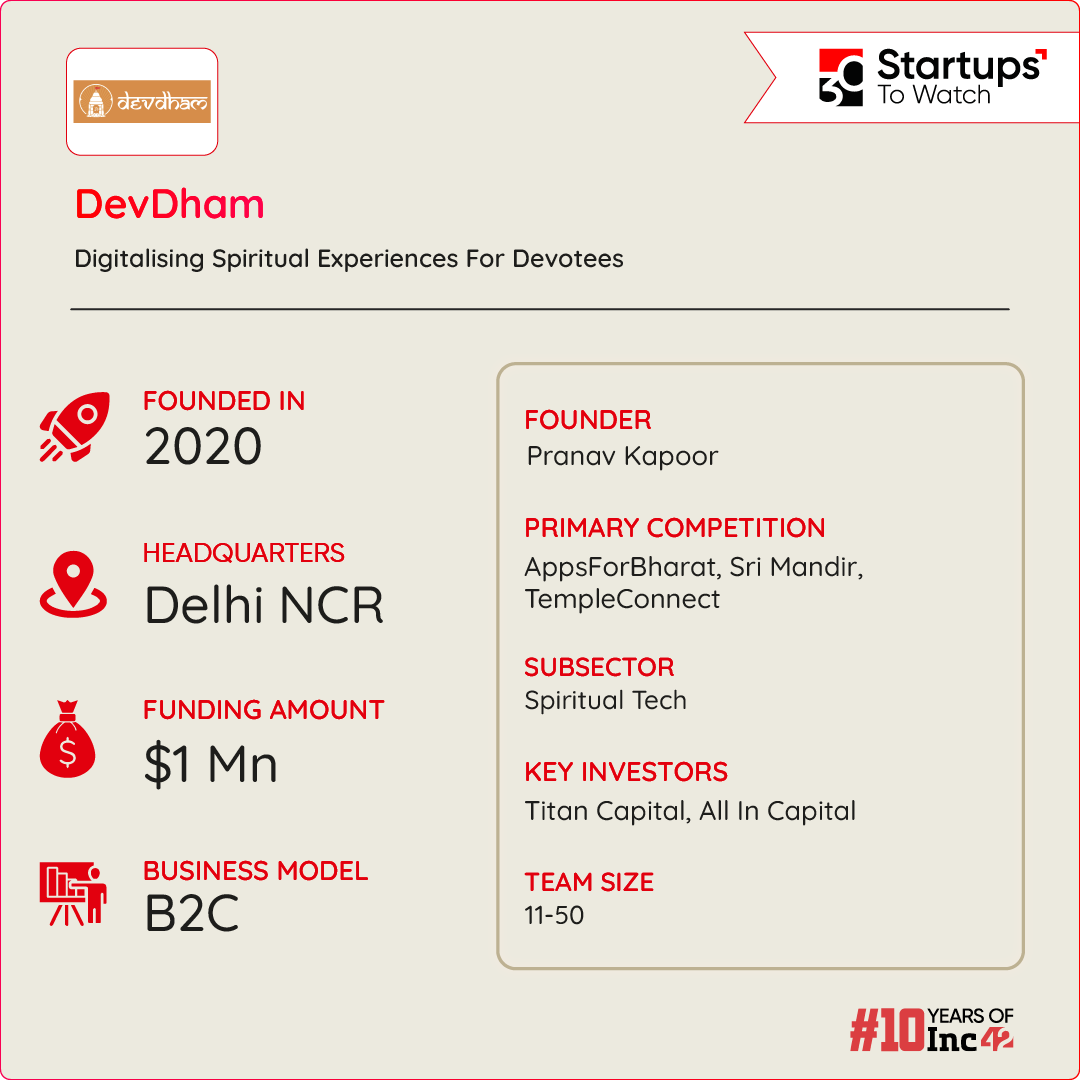
Digitalising Spiritual Experiences For Devotees
In India, the business of faith is booming, and startups in the field of spiritual tech are thriving. This is because the Indian devotional market is estimated to be a $50 Bn market opportunity.
To cash in on highly unorganised space, IIT graduates Pranav Kapoor, Suyash Taneja, and Sagnika Chowdhury founded DevDham, formerly DevDarshan, in 2020.
The startup helps to connect devotees with temples through its app. It leverages tech to provide online daily darshan, conduct pujas, and facilitate digital donations.
One of the notable features of DevDham is its commitment to enable mantra chanting in temples across Bharat, further enhancing the spiritual experience for devotees.
DevDham’s long-term vision is to provide a digital platform for temples to share the millennia-old teachings of Indian culture with the world.
DevDham has built a network of over 500 temples and engaged with more than 2,000 pandits. The startup has claimed to facilitate pujas and darshan experiences for over 1 Lakh happy devotees.
Digital Paani
Transforming Water Assets
Realising the global water shortage crisis affecting 2 Bn people, the father-daughter duo of Mansi Jain and Rajesh Jain understood the transformative potential of wastewater treatment. They founded DigitalPaani in 2020 to resolve water asset management issues with its IoT-enabled integrated operations platform, driving operational excellence while significantly reducing costs.
Its solution operates in three key steps, beginning with a comprehensive assessment of each water asset’s needs based on its design and current operational status. Subsequently, the platform acts as an expert manager, automating processes, providing precise dosing recommendations for chemicals, guiding maintenance tasks, and facilitating troubleshooting when issues arise. Finally, DigitalPaani recommends operational and physical improvements to enhance overall performance.
Unlike traditional approaches that merely monitor or automate equipment, DigitalPaani manages the entire operations process through scalable software, delivering superior results in water quality, reduced losses, and energy savings of up to 50%. Offering two distinct business models, the platform can be sold directly to customers with an IoT add-on pack for upfront fees, empowering building staff to manage water assets independently. Alternatively, partnerships with physical service providers offer complete operations packages for a monthly fee.
DigitalPaani claims to have secured repeat orders from clients like Amazon and Britannia. The company has plans to implement its solution in approximately 175 plants across target markets and secure international pilots for global expansion this year.
Looking ahead, DigitalPaani aims to transform water management in over 4,000 buildings across India and two additional geographies by 2026.
Earthful

Plant-Based Nutrition For All
The plant-based food industry has seen rapid growth not only in India. Expected to expand significantly by 2030, India’s plant-based sector is gaining traction both domestically and internationally.
Founded by Sudha and Veda Gogineni, Earthful focuses on the creation of plant-based multivitamins and protein powders, formulated to tackle nutritional deficiencies in India. Drawing from nature’s bounty, they derive essential nutrients like iron from curry leaves and vitamin C from amla, ensuring efficacy and purity in every product.
Sudha’s background in chemical engineering coupled with her experience at ITC Ltd and Uber, provides a robust foundation for Earthful’s scientific approach. Meanwhile, Veda’s expertise as a biotechnologist complements Sudha’s acumen.
Their struggles with health catalysed Earthful’s genesis. Innovation and research are the two key imperatives for Earthful founders, who leverage their strong science backgrounds and work with a team of doctors and scientists to take their brand to newer heights. The two cofounders actively create content to increase nutrition and wellness awareness among people.
Electrifi Mobility
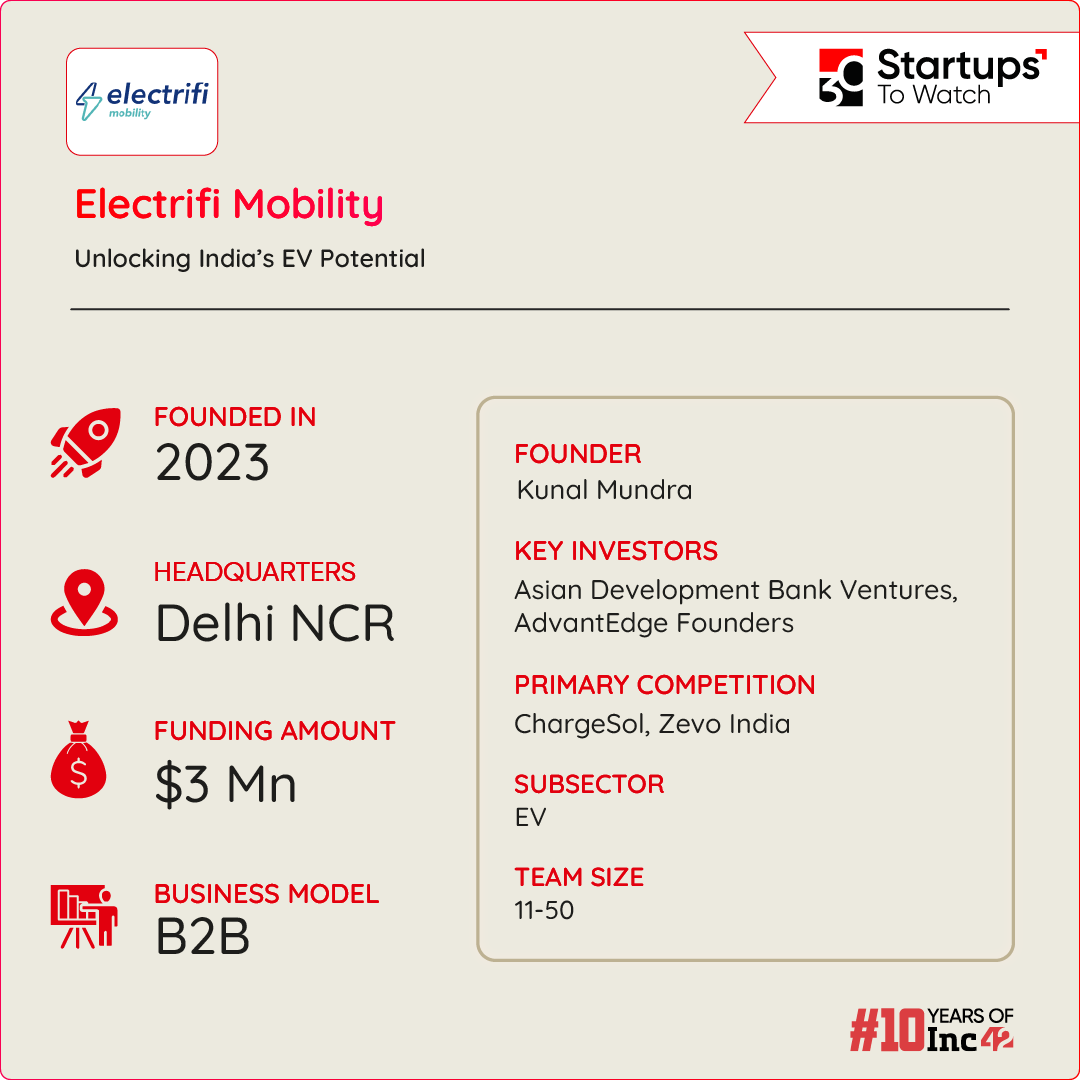
Unlocking India’s EV Potential
Founded in 2023 by former Cars24 CEO Kunal Mundra and Grip Invest cofounder Nikhil Aggarwal, Electrifi Mobility offers comprehensive solutions aimed at facilitating the transition towards electric mobility.
At the core of Electrifi’s offerings is its end-to-end approach, which includes a range of services including leasing, maintenance, post-sales support, refurbishment, and redeployment of EV assets. By providing a holistic suite of services, the company aims to address the various challenges associated with EV adoption, thereby making it more accessible and convenient for businesses and individuals alike.
One of Electrifi’s key strengths lies in its strategic partnership with Grip Invest. In a competitive landscape populated by players such as Ohm Mobility, Alt Mobility, and Vidyut Tech, Electrifi Mobility distinguishes itself through its integrated approach and robust technology platform. By connecting lenders, fleet operators, and reputable original equipment manufacturers (OEMs), Electrifi wants to facilitate collaboration within the EV ecosystem.
The startup’s focus on asset management and leasing enables businesses to transition to electric mobility with minimal upfront investment. By streamlining processes and leveraging technology, the company aims to unlock India’s mobility electrification potential, driving positive environmental and economic impacts.
Evify
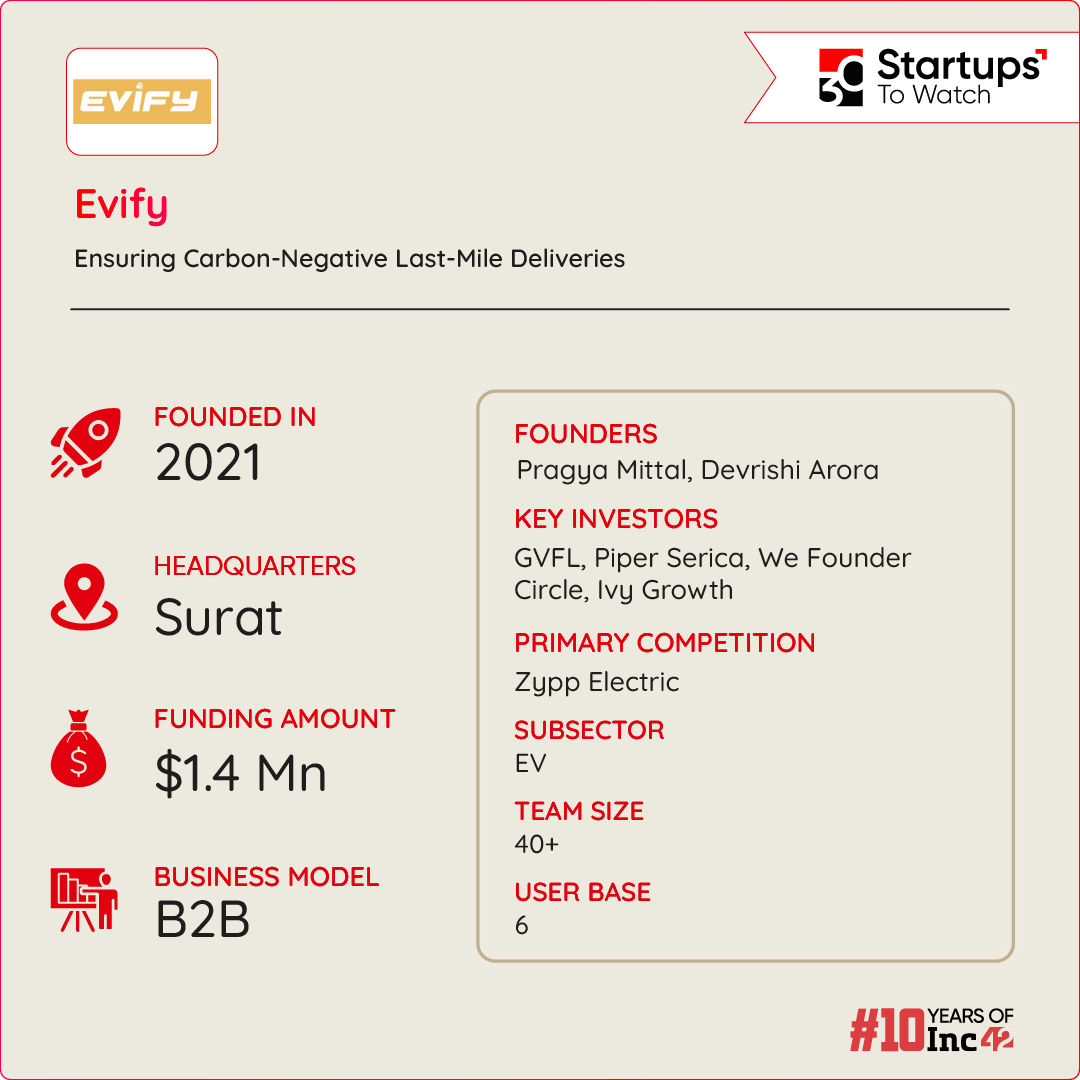
Ensuring Carbon-Negative Last-Mile Deliveries
Sustainability in last-mile delivery is crucial for reducing emissions, minimising environmental impact, and ensuring the long-term viability of logistics operations in an increasingly eco-conscious world.
Surat-based Evify, with its carbon-negative fleet of electric two-wheelers, aims to reduce carbon emissions in last-mile delivery. Evify takes care of onboarding and rider training for its fleet of electric two-wheelers. Clients settle their invoices with Evify at the end of the month. Through its hub and spoke model, the startup maintains complete control over its fleet, optimising efficiency and reliability.
Additionally, its in-house repair centres play a crucial role in maximising vehicle uptime, enabling timely service and dedicated riders for clients. Evify operates on a B2B2C business model, where it works with companies looking for last-mile delivery. The startup also engages gig workers for its operations, according to its website. Evify claims to pay the gig workers on a per-delivery basis.
Fittr
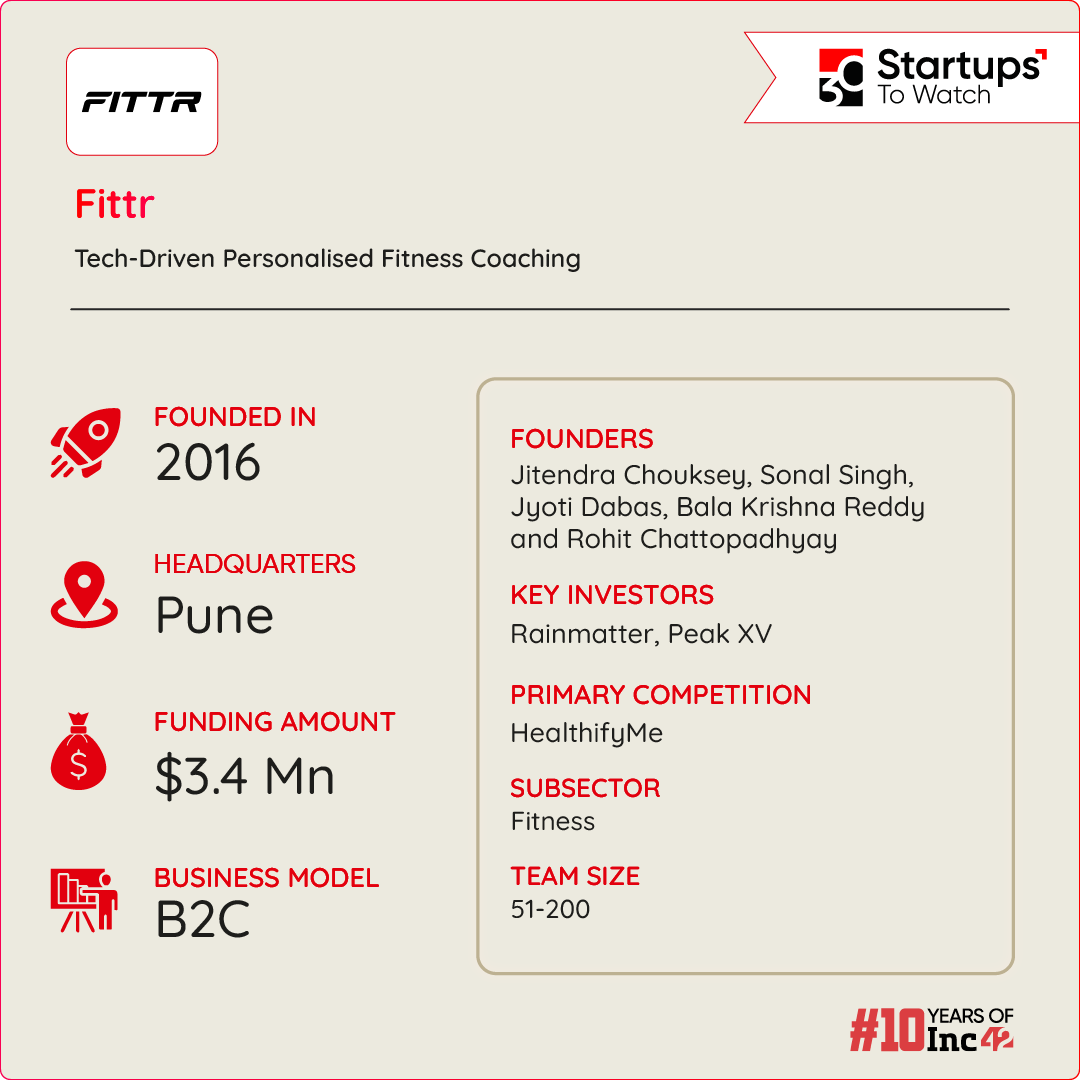
Tech-Driven Personalised Fitness Coaching
Founded by Jitendra Chouksey as a humble WhatsApp group in 2016, Fittr has become a comprehensive health and fitness platform. Originating with a mission to promote wellness, it evolved into a Facebook group before transitioning into a technologically-driven platform in 2022. Presently, Fittr employs both cutting-edge technology and human coaches to cater to the fitness needs of over 3 Mn individuals.
With over 2.5 Lakh monthly active users and more than 5 Mn app downloads, Fittr wants to establish itself as a prominent player in the health and fitness industry. The platform aspires to make 50 Mn people healthier while creating career opportunities in fitness. Fittr aims to position itself as a global leader in coaching, offering science-backed knowledge and personalised guidance to its users.
Operating on a freemium model, Fittr provides users with a suite of user-friendly tools, including a free diet tool, training tool, body fat calculators, and macros calculator. Additionally, it offers personalised guidance and customised plans to assist individuals in achieving their fitness goals effectively.
Herby Angel
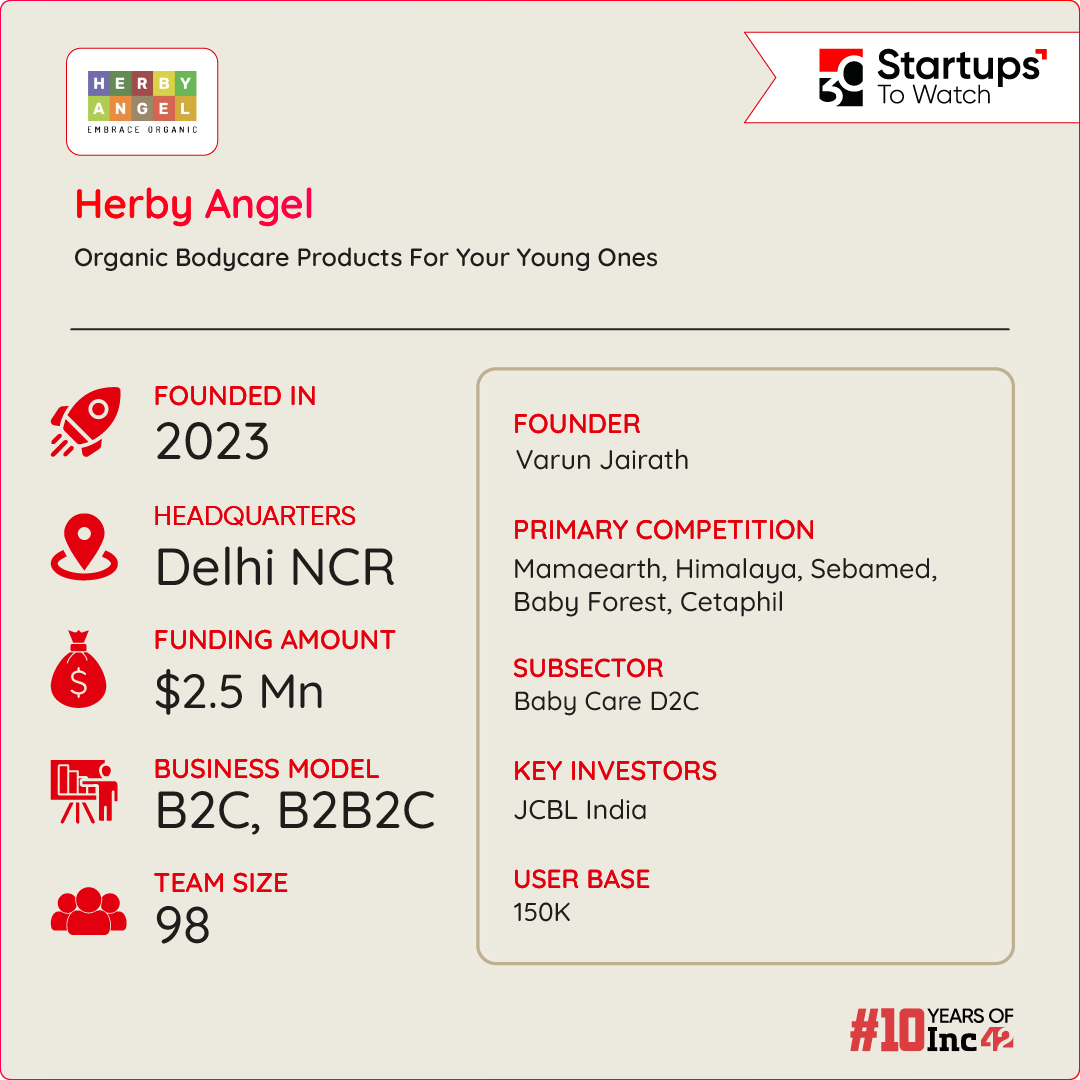
Organic Bodycare Products For Your Young Ones
Currently, India is flooded with baby care brands (both Indian and imported), which claim to be safe and toxin-free. Yet, there are no reliable ways to verify these assertions, which led to the creation of Herby Angel.
Founded in 2023, the startup the startup provides organic, ayurveda-based holistic wellness products for babies and kids. Every batch of its products is tested by the National Accreditation Board for Testing and Calibration Laboratories (NABL), verifying the absence of heavy metals, aflatoxins, pesticides and other toxins.
Herby Angel also publishes the report of its products on its website where it can be verified by parents. The company ensures that all its products are made with organic ingredients and are free from harmful substances.
Herby Angel operates across multiple sales channels, including its website, various online marketplaces and partnerships with distributors in the general trade sector. The startup has expanded from 9 to 13 states in the last three months, increasing the number of distributors from 80 to 149. They’ve also grown their retail presence from 2,000 to 5,000 points, resulting in a substantial revenue increase from INR 55 Lakh to INR 90 Lakh per month.
Its short-term goals for 2024 include achieving a monthly net revenue of INR 3 Cr by December, doubling retail store presence to 10,000 points, and EBITDA profitability by June.
HOGR

The Future Of Social Dining
Founded in 2023 by Jugul Thachery and Harish Harshan, HOGR tackles the pervasive challenge of finding quality food options. Focussed on connecting food enthusiasts and emphasising the social aspect of culinary exploration, HOGR simplifies the “Where to eat” and “What to eat” dilemma through user-generated, peer-to-peer recommendations.
The Bengaluru-based startup works as a gamified food discovery platform that allows users to earn HOGR coins by engaging in platform games, which can be redeemed for exciting offers and discounts.
Its revenue model includes restaurant commissions, micro-monetisation for CRM campaigns, and various advertisement/content-related streams. Currently, the operational focus is on Bengaluru, with plans for gradual expansion across India.
In the short term, HOGR aims to establish a robust food network, fostering connections among enthusiasts through personalised recommendations.
In the long term, the startup wants to cement itself as the premier food exploration platform. This entails enhancing user experience, expanding the restaurant network, introducing dine-in and takeaway options, forging strategic partnerships, and leveraging emerging technologies to stay at the forefront of interactive food exploration.
Houseeazy
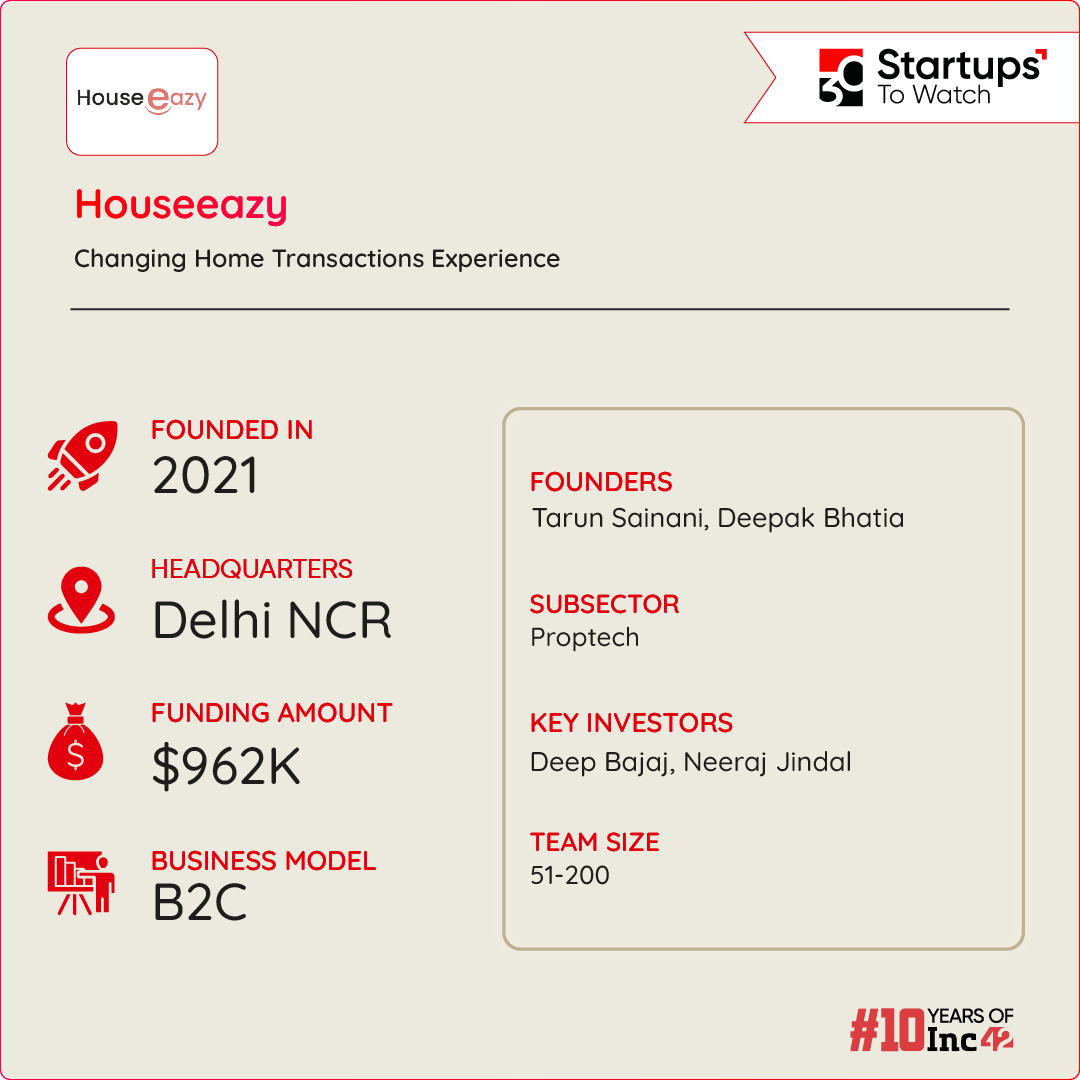
Changing Home Transactions Experience
Houseeazy is a vertical marketplace, which focusses on the pre-owned home buying and selling experience for middle-class consumers. It aims to revolutionise residential resale transactions by making them transparent, simple, and quick.
Founded by Tarun Sainani and Deepak Bhatia in 2021, HouseEazy offers instant quotes to sellers, backed by an upfront token of 10%.
The customer-centric platform provides a hassle-free experience, ensuring instant pricing, liquidity, and timeline certainty. Verified and consolidated inventory, title checks, and end-to-end services contribute to a seamless transaction process.
HouseEazy tackles resale market challenges through ML-based underwriting, boasting a pricing algorithm with over 90% accuracy.
While currently operational in Noida and Ghaziabad, HouseEazy aims for market leadership in Delhi NCR, with plans for expansion into Pune and Bengaluru in 2024. The startup envisions market leadership in the top seven cities of India by 2026.
LarkAI Healthcare
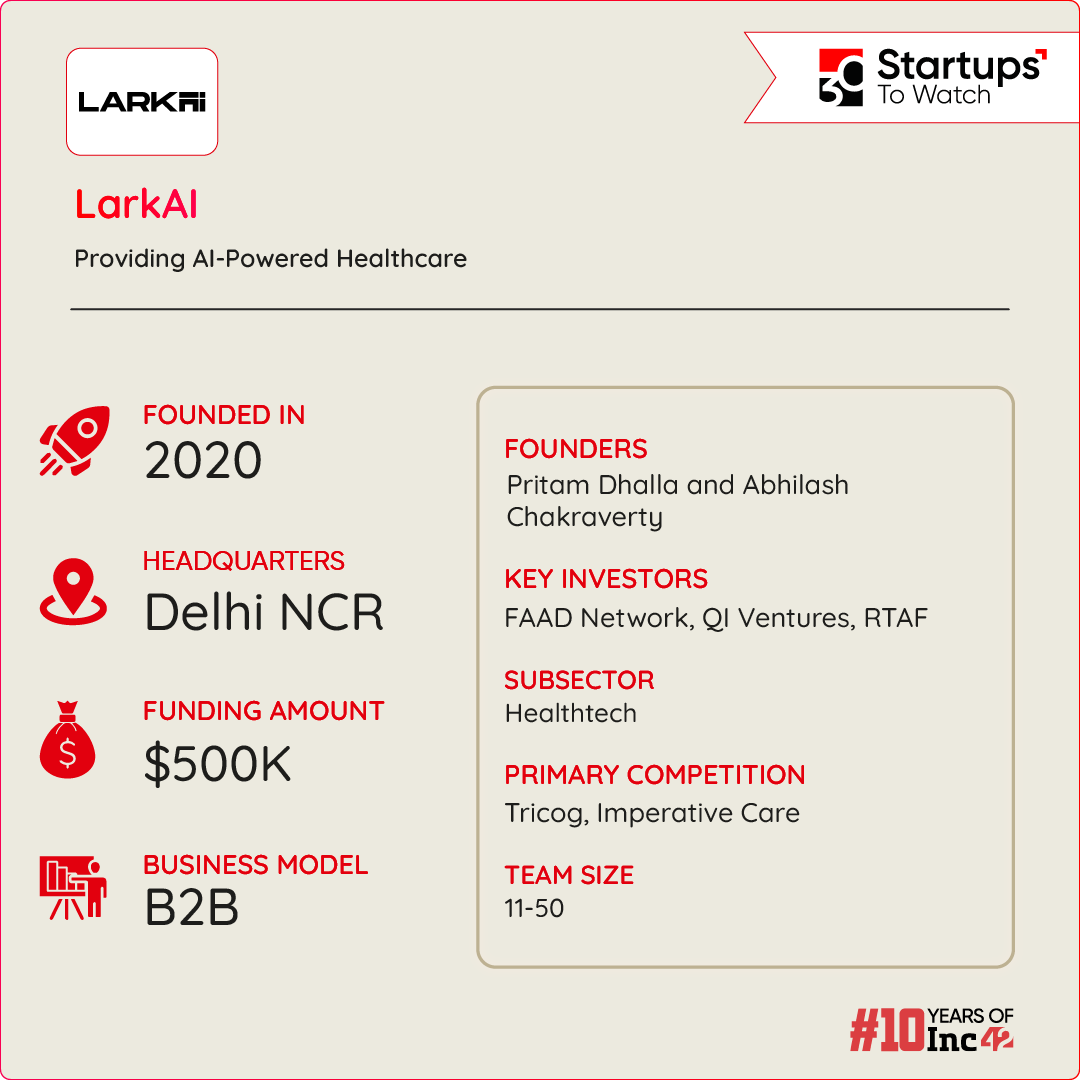
Providing AI-Powered Healthcare
Founded in 2020 by Pritam Dhalla and Abhilash Chakraverty, LarkAI Healthcare is using AI to detect heart issues at an early stage.
One of the notable features of the Bhubaneswar-based startup is its device that can detect early-stage heart impulses and valvular diseases within a remarkable 15-second timeframe. This rapid diagnostic capability has the potential to significantly improve patient outcomes by allowing for timely intervention and treatment.
In addition to cardiovascular diagnostics, the startup has developed a smart inhaler cap aimed at reducing drug wastage during the treatment of asthma and pulmonary tract disorders. This innovation aligns with the growing emphasis on sustainability in healthcare, ensuring that medication is administered efficiently while minimising environmental impact.
MyEra
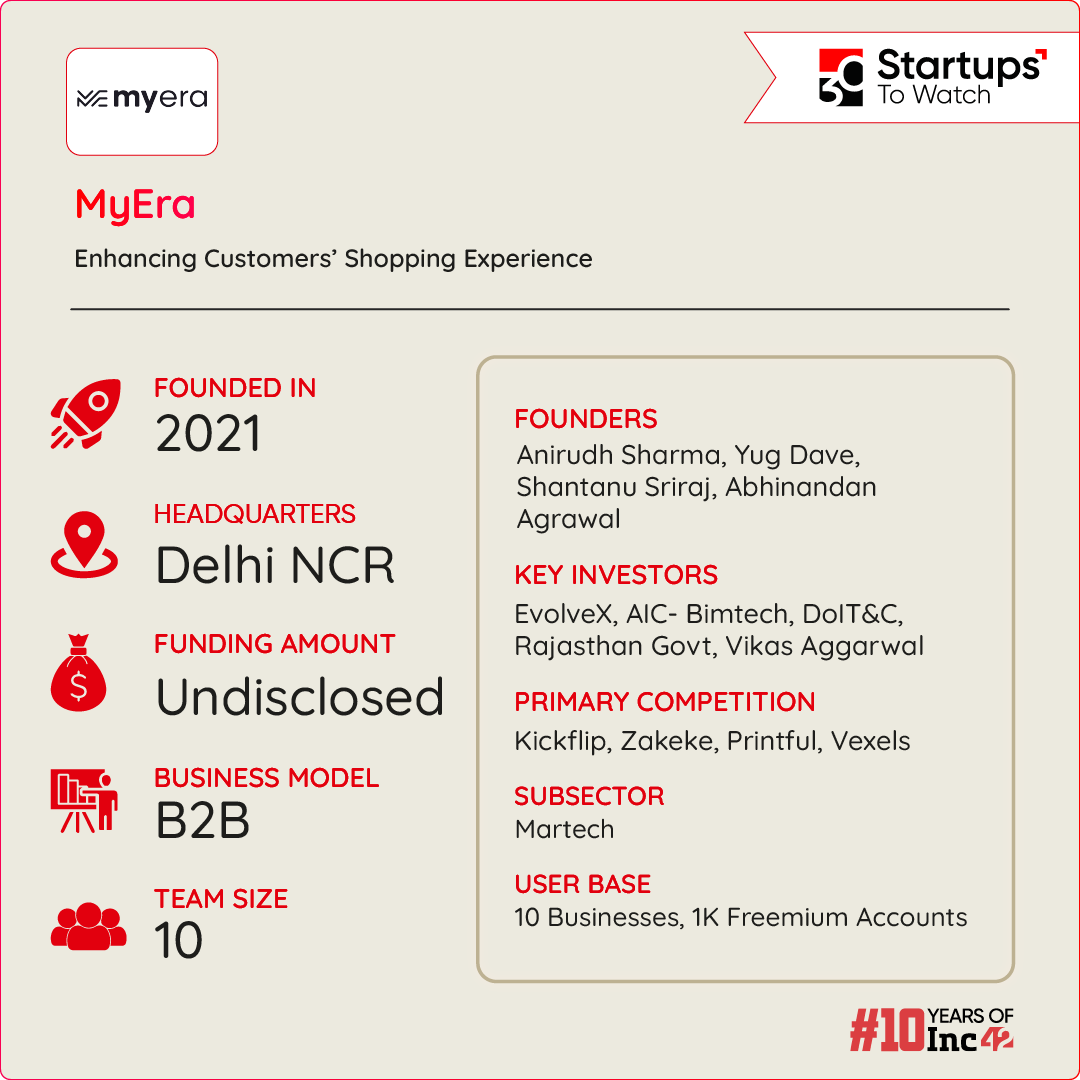
Enhancing Customers’ Shopping Experience
MyEra aims to enhance the overall shopping experience for consumers while driving sales for businesses. With MyEra Button, it makes online shopping more engaging by seamlessly integrating personalised product customisation directly into any website or online store. Shoppers can customise colours, materials and graphics without leaving the platform, enhancing their shopping experience.
Its product ‘MyEra Product Customizer’ seamlessly integrates into any online store or website, enabling buyers to personalise products without leaving the platform. Users can customise colours and materials and add custom text or graphics, enhancing their shopping experience.
Moreover, its MyEra Quote Calculator generates precise price estimates tailored to user preferences, simplifying tasks such as tile count and cost calculation, bulk packing considerations, and print orders. Together, these tools optimise the customisation process, streamlining operations and enhancing user satisfaction.
In the short term, MyEra aims for aggressive user growth, establishing recurring revenue streams, raising a Seed round, enhancing sales capabilities, and refining technology to meet validated needs. By 2026, the focus will shift to building a strong presence in the US and European markets, achieving operational break-even, and securing Series A funding for further expansion and development.
Peptris
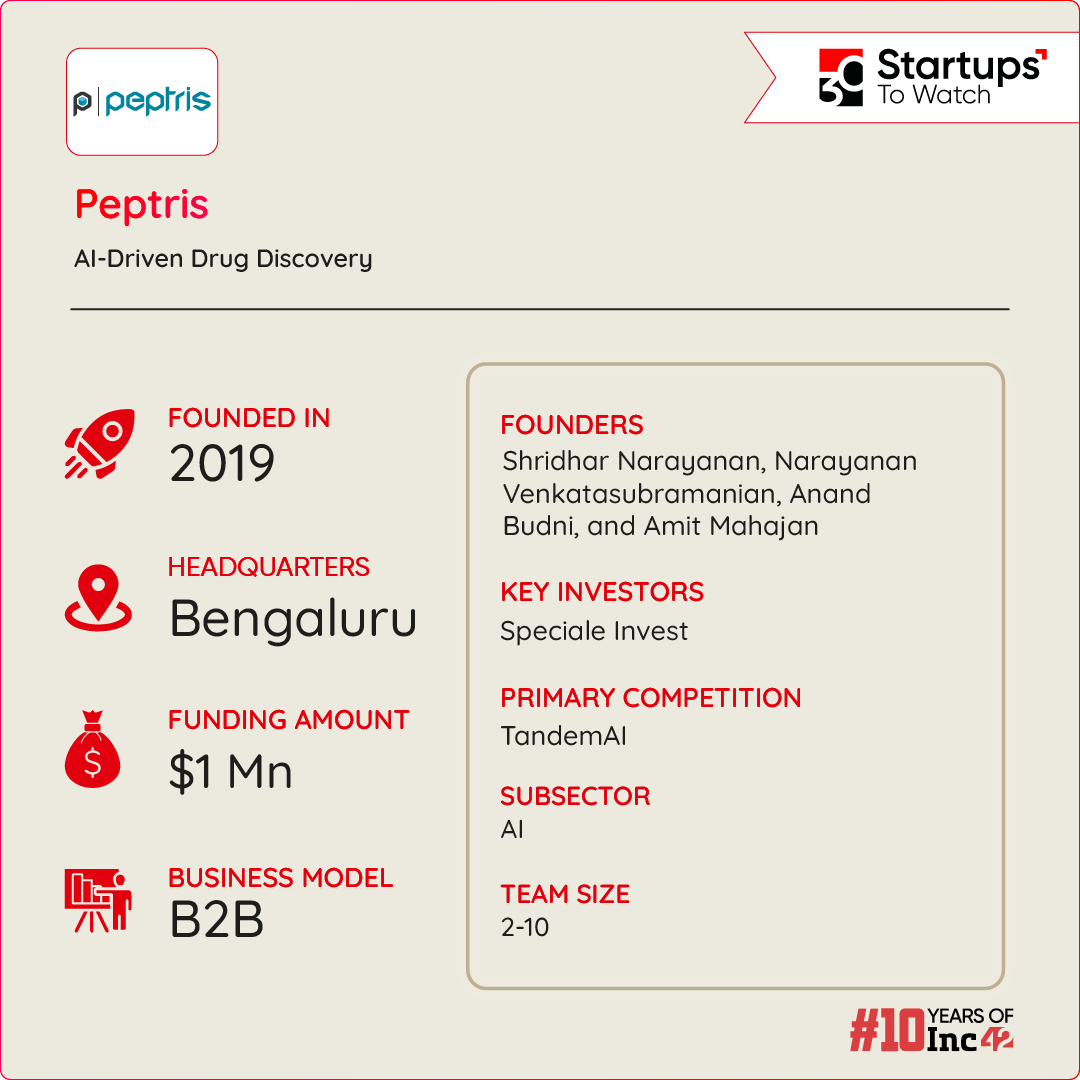
AI-Driven Drug Discovery
In recent years, Indian pharmaceutical companies have been attempting to shift their focus towards the development of innovative medicines. Despite this ambition, the transition by Indian generic drug makers in the drug discovery segment has been slow.
Peptris Technologies, headquartered in Bangalore, is introducing innovation in the field of drug discovery by harnessing the power of its cutting-edge AI platform. Specialising in AI-driven drug discovery, Peptris wants to reshape an industry characterised by lengthy timelines and exorbitant costs.
Peptris is addressing these challenges by efficiently navigating vast chemical libraries using its state-of-the-art technology, thereby identifying drug candidates with remarkable precision. This approach marks a significant departure from conventional methods, offering a more streamlined and cost-effective solution.
Peptris Technologies wants to capitalise on the recent advancements in AI technology, particularly in unsupervised learning and the availability of extensive chemical libraries.
By leveraging the capabilities of AI, Peptris expedites the identification and development of potential drug candidates. This not only accelerates the overall drug discovery process but also has the potential to make essential medications more accessible by mitigating financial barriers.
Quebeq Venture

Creating A Carbon-Negative Ecosystem
Founded in 2019 by Logesh Janarthanan, Chennai-based Quebeq Ventures specialises in Smart Grid energy solutions. At the forefront of their innovative offerings is the proprietary portable windmill, SmartPO, alongside Digital Twin and Digital Breaker Circuits. The startup aims to contribute to the acceleration of green energy adoption.
One of the standout features of Quebeq Ventures’ approach is integrating a micro-level virtual power plant (VPP). This solution not only alleviates stress on utility distribution transformers but also plays a crucial role in reducing overall energy consumption and CO2 emissions.
The company’s research and development efforts are strategically focussed on collaboration with government entities, private enterprises, and utility companies. Through these partnerships, Quebeq Ventures aims to advance Micro VPPs, leveraging its innovative SmartPO technology.
Reeudo

Cross-border Payments Facilitator For Students
Founded during the 2020 lockdown in India, Reeudo wants to address the challenges of cross-border payments for students. Originating from the firsthand experiences of its two executives navigating the complexities of paying tuition fees and managing monthly expenses in different countries, Reeudo offers its services to students, colleges, and universities in 25+ countries.
With a sole focus on cross-border payments for students, Reeudo has forged partnerships with multiple banking institutions, ensuring the security of student funds through an escrow system while facilitating seamless transfers to beneficiary accounts at universities worldwide.
Reeudo wants to extend its scope beyond mere transactional facilitation. It aims to revolutionise the entire student journey by digitising workflows and streamlining processes. Recognising the growing trend of Indian students pursuing programmes abroad, Reeudo endeavours to bridge existing gaps in the ecosystem, making the journey smoother and more cohesive.
Sahaj Gaming

Reinventing Indian Board Games
Founded by Deepak Saini, former VP and head of product at Games24x7, along with his former colleague Rahul Bantiya, who led revenue growth and retention for RummyCircle in 2023, Sahaj Gaming is re-inventing popular Indian board games.
The gaming studio aims to build a suite of games rooted in Indian culture such as Ludo, Snakes & Ladders, Tambola and Checkers. The recently launched beta of Sahaj Gaming’s 1ludo has already seen 25,000 pre-registrations. The game is available for pre-registration on the Google Play Store and is expected to go live shortly.
Further, the RMG variant of the game will be available soon after the free-to-play Google Play Store release.
Salty
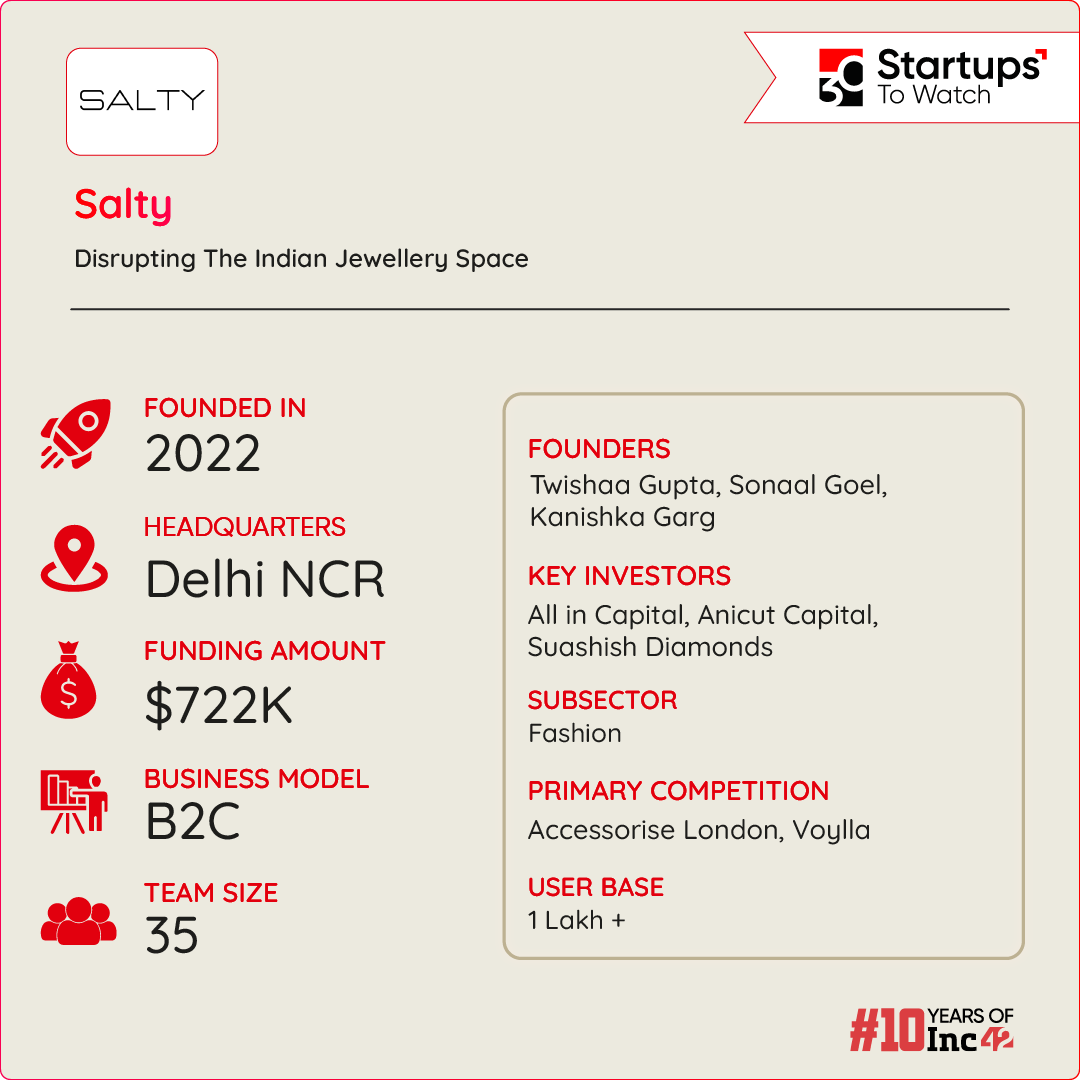
Disrupting The Indian Jewellery Space
Founded in 2022 by Twishaa Gupta, Sonaal Goel, and Kanishka Garg, Salty wants to stand out in the realm of fashion jewellery by offering pieces crafted from high-quality alloys. The brand utilises superior alloys and stainless steel, ensuring durability without compromising affordability, and minimising the risk of allergies.
With a diverse collection boasting over 2,000 designs, Salty introduces a distinctive jewellery gift box, containing 4-5 trendy pieces — an ideal choice for consumers seeking uniqueness. Notably, Salty pioneers an extensive men’s line, featuring high-quality stainless steel and sterling silver materials. The brand plans to expand its men’s collection to include over 1,000 designs.
While currently concentrating on the Indian market, Salty is getting traction beyond metro cities. A notable 50% of their sales originate from Tier II and beyond cities, with substantial demand from northeastern states and Jammu Kashmir.
Within one year of operation, the brand claims to have achieved remarkable milestones, surpassing 1 Lakh orders and achieving $1 Mn in Annual Recurring Revenue (ARR).
SportVot
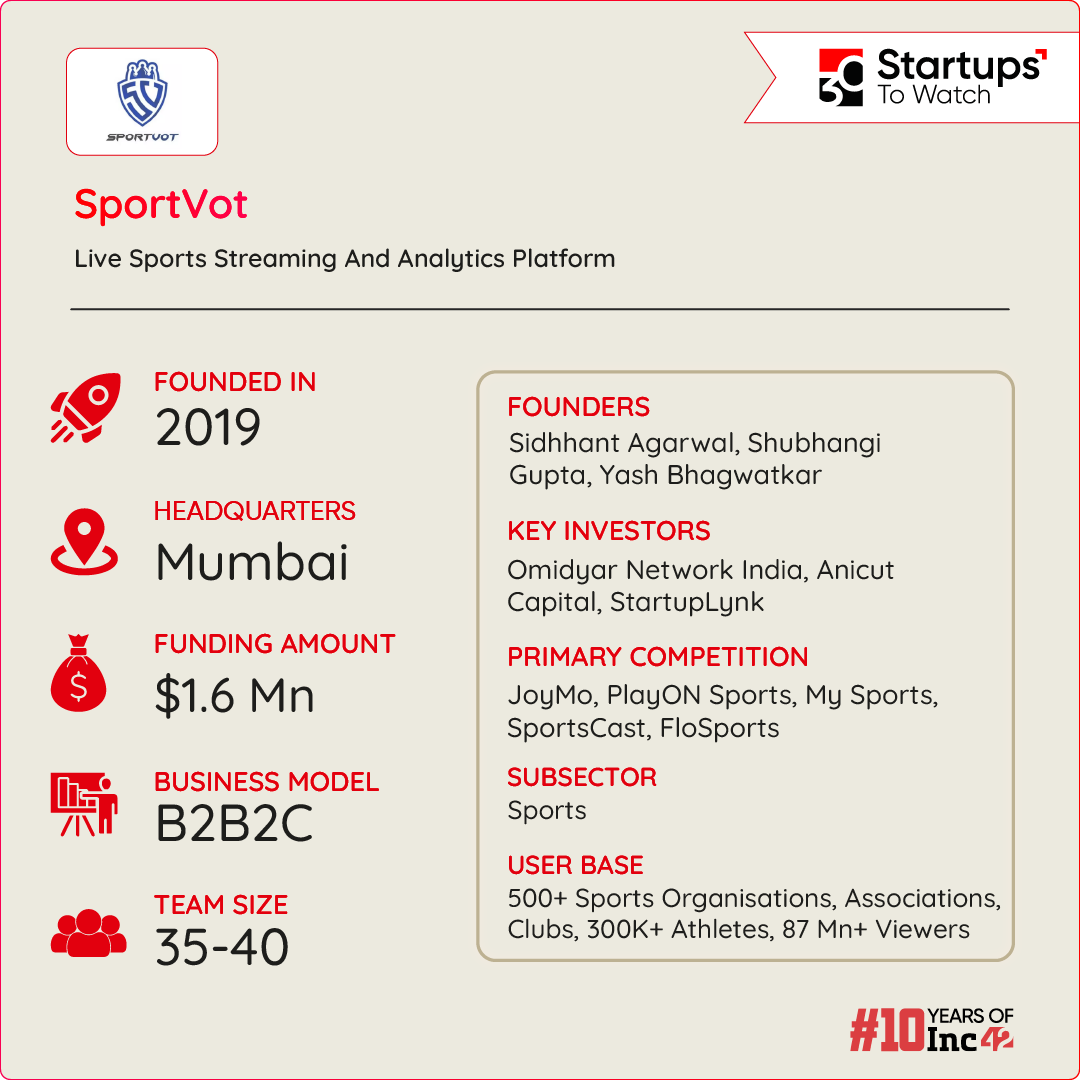
Live Sports Streaming And Analytics Platform
The absence of an effective infrastructure for talent development at the school, block, and district levels often leads to numerous talented athletes failing to reach their full potential and compete at state or district levels in sports.
To address the absence of a structured and transparent talent discovery process at the grassroots, Sidhhant Agarwal, Yash Bhagwatkar and Shubhangi Gupta founded SportVot in 2019. The Bengaluru-based startup enables streaming with the least amount of resources and provides tools that help sports entities edit, analyse, and share videos across channels.
SportVot’s target market encompasses the 99% of sports matches that are not streamed, including about 300k official sports tournaments annually, totalling approximately 5 Mn matches in India alone. The startup provides a comprehensive suite of solutions, including the SportVot Cloud Studio, a versatile web-based production studio facilitating premium live sports production and broadcasting from any deviceAdditionally, SportVot OTT offers live sports action, match highlights, and best moments from grassroots to national tournaments across 15+ sports. SportVot Play promotes active lifestyles by providing pay-and-play access to top-notch facilities.
SportVot’s revenue model includes streaming subscriptions for tournament organisers and sports entities, generating income from advertisement and sponsorship placements within their streaming platform, and leveraging sports tournaments’ intellectual properties for additional revenue streams.
Supaboard

Database Analytics Made Simple
As businesses grow and accumulate data, navigating databases becomes crucial for progress. However, many lack the expertise, limiting them to analytics tools like Google Analytics. Hiring data analysts or database engineers and investing in tools like Power BI or Tableau can bridge this gap but comes with significant monthly costs. This leaves valuable data untapped, hindering business potential.
Aritra Ghosh and Subhrajyoti Modak identified this gap and founded Supaboard in 2023. The startup offers instant, real-time analytics through plain English queries with the help of GenAI and LLMs. Users can generate charts, metrics and tables, pinning valuable insights to customisable dashboards within minutes. Setup is swift, requiring only a database connection string paste, with Supaboard analysing and indexing data structures.
Moreover, users can collaborate with team members, share dashboards, and connect with platforms like Slack and Teams. Supaboard ensures data security by only accessing read-only data without storing or using customer data for training purposes.
Supaboard operates under a B2B SaaS model with a revenue structure based on freemium offerings. The platform provides a limited free plan, allowing 30 questions per month. Users seeking enhanced functionality can opt for paid plans, offering access to additional features and resources.
The Bengaluru-based startup launched its product in February. It aims to expand its reach in 2024. Short-term goals include integrating solutions for diverse databases, collaborating with various SaaS platforms, and acquiring 100 business clients.
Swirl

Helping You Turn Your Viewers Into Shoppers
Cofounded by Kaizad Hansotia and Bheshaj Joshi, Swirl is leveraging the power of interactive video content to enhance people’s shopping experience. Swirl aims to transform short videos and livestreams into engaging, shoppable experiences, enhancing revenue streams and fostering deeper customer engagement.
At its core, Swirl offers a suite of solutions tailored to meet the diverse needs of modern consumers and businesses. This includes shoppable video content, characterised by its bite-sized, snackable format with embedded shopping functionalities.
Additionally, Swirl offers immersive livestream shopping experiences, where hosts interact with thousands of viewers in real-time, creating a sense of community and urgency around product purchases. Moreover, the platform enables the conversion of user-generated content and video reviews into compelling shoppable content, amplifying authenticity and driving conversions.
Operating on a SaaS subscription model, Swirl provides customers with flexibility, charging a fixed fee supplemented by variable usage costs based on factors like watch time and video traffic. With a presence across countries like India, Canada, the US, the UAE, Pakistan, Singapore and Nepal, Swirl has garnered a global clientele spanning retail and D2C sectors.
The startup’s short-term plans involve penetrating the lucrative US and UAE markets while fortifying the product suite with advanced AI capabilities to enhance customer experiences and boost SEO performance.
TestnTrack
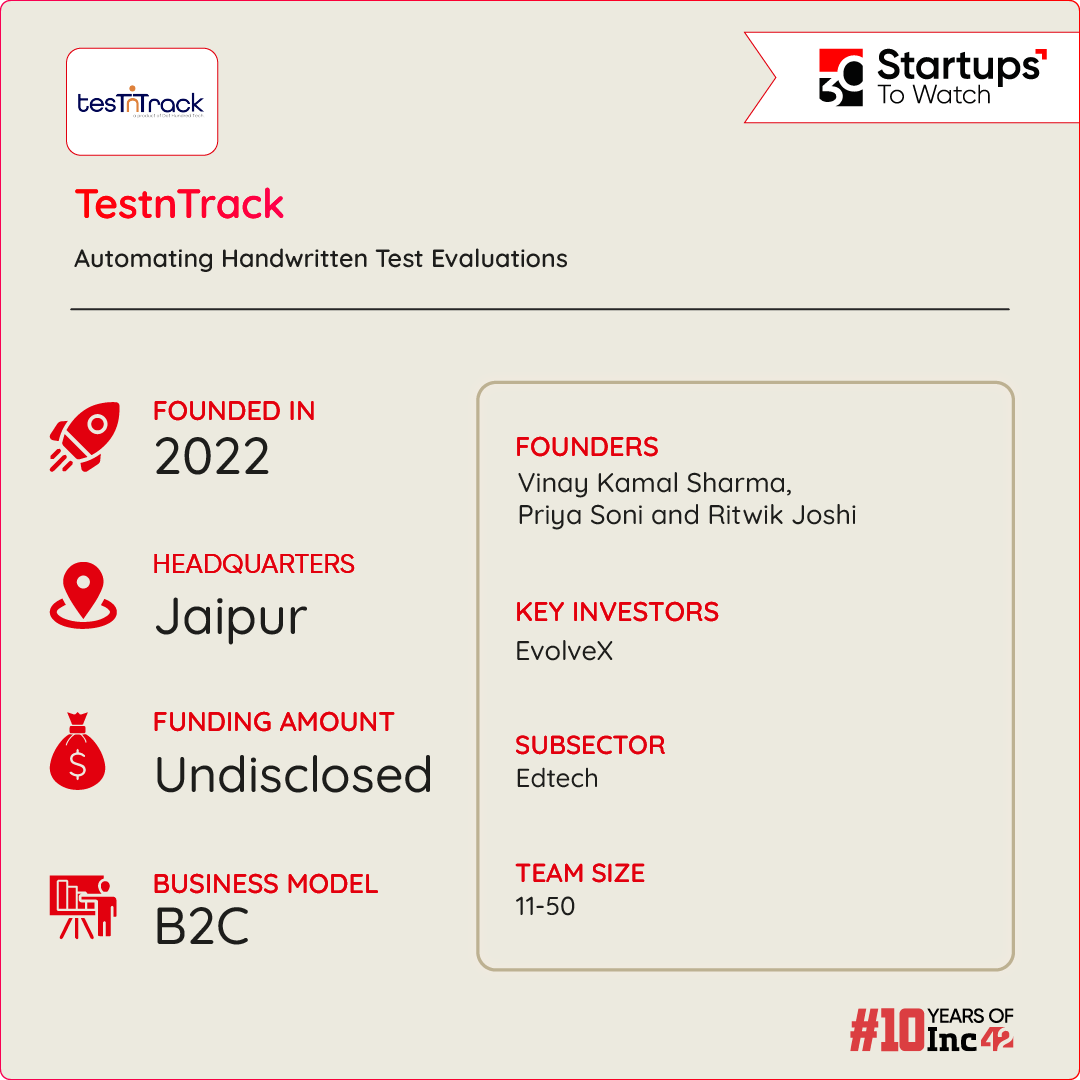
Automating Handwritten Test Evaluations
Founded in 2022 by Vinay Kamal Sharma, Priya Soni, and Ritwik Joshi, Jaipur-based TestnTrack is changing the conventional hand-written assessment process in educational institutions and coaching centres.
The startup automates manual copy-checking, saving teachers significant time and effort. Using AI, teachers can scan and upload students’ answer sheets for real-time processing, providing not just scores but also audio feedback promptly.
Since its launch in May 2022, TestnTrack has onboarded over 112 institutions across three states and six cities, evaluating more than 56,000 test sheets to date. With a target revenue of INR 1.8 Cr in FY24, TestnTrack is also aiming to expand its footprint across 25 cities.
Twyn

Phygital Twin Platform For Manufacturing
Founded by Avi Dahiya in 2021, Twyn leverages technologies such as AI and spatial computing to create extended reality-based digital twins for manufacturing units. These “phygital twins” bridge the gap between physical assets and their digital counterparts, offering a live and connected representation of the manufacturing environment.
Its flagship product, Twyn’s Phygital Twin Platform, changes how manufacturers monitor, optimise, and automate their operations. By seamlessly integrating data from multiple sensors, 3D models, and existing enterprise systems like MES, ERP, and SCADA, Twyn enables real-time monitoring, simulation, and optimisation of business operations.
The platform’s key differentiators lie in its ease of deployment and scalability, addressing the challenges faced by traditional digital twin solutions. With a DIY approach akin to setting up SCADA systems, Twyn drastically reduces deployment time and costs, making digital twins accessible and scalable for enterprises of all sizes.
With five patents pending in India and final filings in the US and EU, Twyn ensures the protection of its innovative technology. Revenue is generated through a subscription model supplemented by annual maintenance contracts and product certifications.
In the short term, Twyn aims to increase revenue by $5 Mn, establish a joint experience centre with TCS in KSA, and strengthen its presence in Europe. Long-term plans involve strategic integration with tech giants like Microsoft, Siemens Energy, TCS, and Accenture to scale its business to 150 geographies by 2026.
Zocket
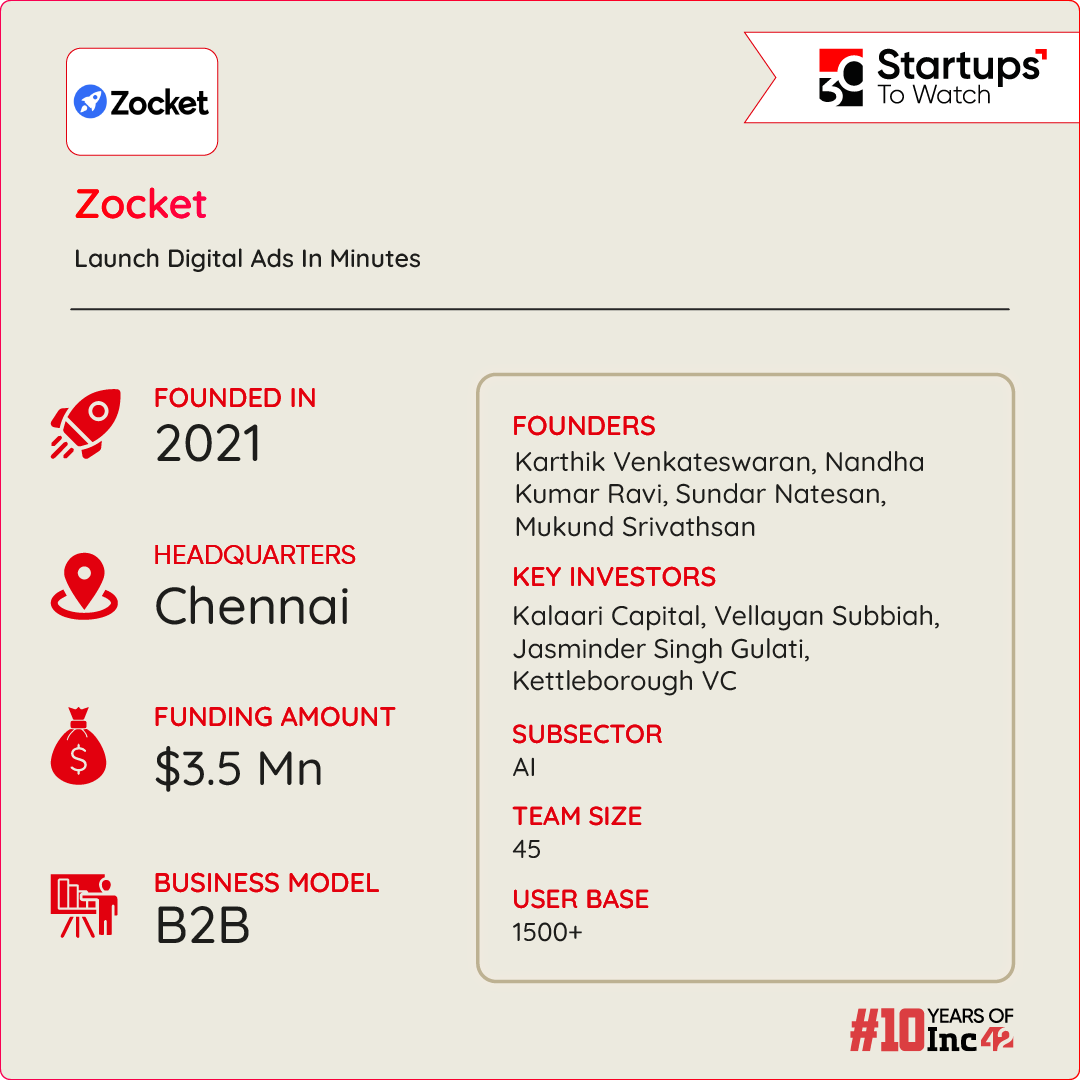
Launch Digital Ads In Minutes
Founded by Karthik Venkateswaran, Nandha Kumar Ravi, Natesan Sundar, and Mukund Srivathsan in 2021, Zocket is a Gen AI-powered product, which helps businesses create digital ads in minutes.
Zocket uses AI/ML models to instantly create ad copies across multiple social media platforms including Facebook, Instagram, and Google based on what the business wants to promote.
Zocket also provides tailored target audience segments across platforms and helps optimise ads for optimal results. For global businesses, Zocket provides a web app, which enables D2C brands in Shopify to launch ads aimed at increasing their website sales. Zocket auto-creates ad copies directly from the product catalogue and launches the sales campaign in no time for Shopify storefronts.
Zocket aims to tap at least around 10% of the growing $550 Bn+ digital advertising market with its self-serve AI product, which can be a potential replacement for traditional human-led agencies.
[Edited by Shishir Parasher]
Startup Stories
Byju’s partially pays March salaries, pending February payouts.

Byju’s, a prominent player in the edtech industry, has encountered financial challenges resulting in delayed salary payments for its employees. As of April 20, the company has only disbursed a portion of March salaries, attributing the delay to a severe cash crunch. Despite earlier assurances from the company’s management that salaries for March would be paid by April 18, many mid-senior employees have reported receiving only 50% of their March salaries. Additionally, February salaries remain unpaid for a significant number of employees, further exacerbating the situation.
Founder and CEO, Byju Raveendran, has resorted to raising personal debt against his stakes in the company to facilitate salary payments. This underscores the severity of the financial challenges facing Byju’s and highlights the lengths to which Raveendran is willing to go to address the issue.
Employee testimonies reveal the extent of the salary delays, with one employee stating that they received only 50% of their March salary on April 20, with 80% of their February salary still pending. Another concerning aspect is the reported disparity between junior and senior employees, with junior staff receiving full salary payments while top management has gone without salaries for the past two months.
Byju’s has acknowledged the delay in salary payments but has not provided a detailed explanation for the situation. A company spokesperson declined to comment on queries from ET regarding the matter. In an email sent to employees on April 8, the management team expressed regret over the delay and attributed it to the inability to secure approval to access funds from a rights issue. The delay has been further compounded by actions from foreign investors, hindering the company’s access to necessary funds.
This revelation follows a previous report by ET on April 1, which highlighted Byju’s decision to delay salary payments due to constraints imposed by warring investors, limiting the company’s access to funds through a rights issue. The ongoing dispute with investors, including Dutch investor Prosus, has added to Byju’s financial woes and has led to further delays in resolving the issue.
In a separate development, Byju’s India chief executive, Arjun Mohan, announced his departure from the company in mid-April, just six months after assuming the role. This unexpected move prompted founder Byju Raveendran to take on the responsibility of overseeing day-to-day operations of the company’s India business, housed under Think & Learn, marking a significant shift in leadership.
Amidst these challenges, Byju’s is embroiled in a legal battle with a group of investors led by Prosus, who are seeking to block a rights issue and the removal of Byju Raveendran as CEO. The company has also initiated arbitration proceedings to address the dispute and find a resolution.
The rights issue undertaken by Byju’s is significant, as it is being offered at a staggering 99% discount to the company’s peak valuation of $22 billion. This steep discount has implications for investors who choose not to participate in the funding, potentially resulting in a significant dilution of their shareholding post-completion of the rights issue.
The unfolding events at Byju’s underscore the challenges facing the edtech giant as it navigates financial constraints, leadership transitions, and legal disputes. The company’s ability to address these issues effectively will determine its future trajectory and its ability to maintain its position in the competitive edtech landscape.
Startup Stories
Revolut India receives provisional approval for PPI license from RBI

Revolut India, a neobank backed by Tiger Global and Softbank, has secured an in-principle approval from the Reserve Bank of India (RBI) for issuing Prepaid Payment Instruments (PPI), encompassing prepaid cards and wallets. CEO Paroma Chatterjee shared this development in a LinkedIn post on Friday. This approval complements Revolut India’s existing licenses from the RBI, which allow it to function as a Category-II Authorised Money Exchange Dealer (AD II), enabling the issuance of multi-currency forex cards and cross-border remittance services.
Chatterjee emphasized the significance of this milestone, highlighting the opportunity it presents to provide Indian consumers with both international and domestic payment solutions on a unified platform. Revolut, Europe’s largest neobank, entered the Indian market in 2021 with aspirations to disrupt the domestic payments sector. The RBI’s approval is expected to bolster Revolut’s position as a key player in this domain.
Prepaid Payment Instruments (PPIs) are payment tools that utilize stored monetary value, including digital wallets, smart cards, or vouchers, for transactions. RBI Governor Shaktikanta Das proposed on April 5, 2024, to allow PPIs to be linked through third-party UPI applications, enabling PPI holders to conduct UPI payments akin to bank account holders.
Chatterjee underscored Revolut’s commitment to full compliance with regulatory requirements, particularly in India, where the neobank has undertaken significant efforts to localize its global tech-stack to adhere to local regulations.
In an interview with ET BFSI, Chatterjee disclosed Revolut’s plans to introduce a comprehensive suite of digital-first money management services for all Indian customers. These services will enable users to manage their finances, including payments and remittances, both domestically and internationally.
The app, currently in use by employees, will be officially launched once the internal testing phase is completed, according to Chatterjee. She also revealed that there are over 175,000 prospective customers on Revolut India’s waitlist, indicating strong interest in the product.
Startup Stories
Postman buys Orbit to extend developer community reach.

Postman, renowned as an API management platform tailored for enterprises, has recently made headlines with its acquisition of Orbit, a pivotal tool in the arsenal of developer companies for nurturing communities across a spectrum of platforms, including Discord, Slack, and GitHub. Although the specifics of the financial transaction remain undisclosed, Postman took to its blog to underline Orbit’s indispensable role in supporting major developer companies in fostering community management and fostering growth over the course of the past four years.
Within the ecosystem of Postman, the integration of Orbit is poised to be transformative, with the Orbit team set to assume a pivotal role in seamlessly embedding community-centric features into the fabric of the Postman Public API Network. This strategic move is aimed at catalyzing dynamic collaboration between content creators and end-users within the network. Postman, boasting a staggering valuation of $5.6 billion, stands as a stalwart in the realm of API collaboration platforms, serving a user base exceeding 30 million developers and 500,000 organizations.
Under the stewardship of Noah Schwartz, a recent addition to the Postman team hailing from Amazon Web Services, the Orbit team is primed to spearhead initiatives aimed at empowering API distributors to broaden the horizons of their communities, optimize API utilization, and solicit direct feedback from users entrenched within the network.
This integration is anticipated to embolden developers to unearth APIs tailored to their unique requirements and foster meaningful engagements with peers to extract maximum value from each API. However, as part of the transitionary phase, Orbit has outlined plans to gradually phase out its existing product and platform over the span of the next 90 days. Commencing July 11, all functionalities will be deactivated, with no provision for the creation of new users or workspaces.
Postman’s strategic maneuver comes on the heels of its triumphant fundraising endeavor in 2021, securing a whopping $225 million in funding. The fundraising round, spearheaded by Insight Partners, witnessed active participation from prominent entities such as Coatue, Bond Capital (helmed by Mary Meeker), and Battery Ventures.
-

 Startup Stories1 year ago
Startup Stories1 year agoWhy Millennials, GenZs Are Riding The Investment Tech Wave In India
-

 Startup Stories1 year ago
Startup Stories1 year agoStartups That Caught Our Eyes In September 2023
-

 Startup Stories1 year ago
Startup Stories1 year agoHow Raaho Is Using Tech To Transform India’s Fragmented Commercial Trucking
-

 Startup Stories1 year ago
Startup Stories1 year agoMeet The 10 Indian Startup Gems In The Indian Jewellery Industry’s Crown
-

 Crptocurrency9 months ago
Crptocurrency9 months agoLither is Making Crypto Safe, Fun, and Profitable for Everyone!
-

 Startup Stories1 year ago
Startup Stories1 year agoHow Volt Money Is Unlocking The Value Of Mutual Funds With Secured Lending
-

 E-commerce1 year ago
E-commerce1 year agoTop Online Couponing Trends To Watch Out For In 2016
-

 Startup Stories1 year ago
Startup Stories1 year agoWhy Moscow-Based Kladana Considers Indian SME Sector As The Next Big Market For Cloud Computing

